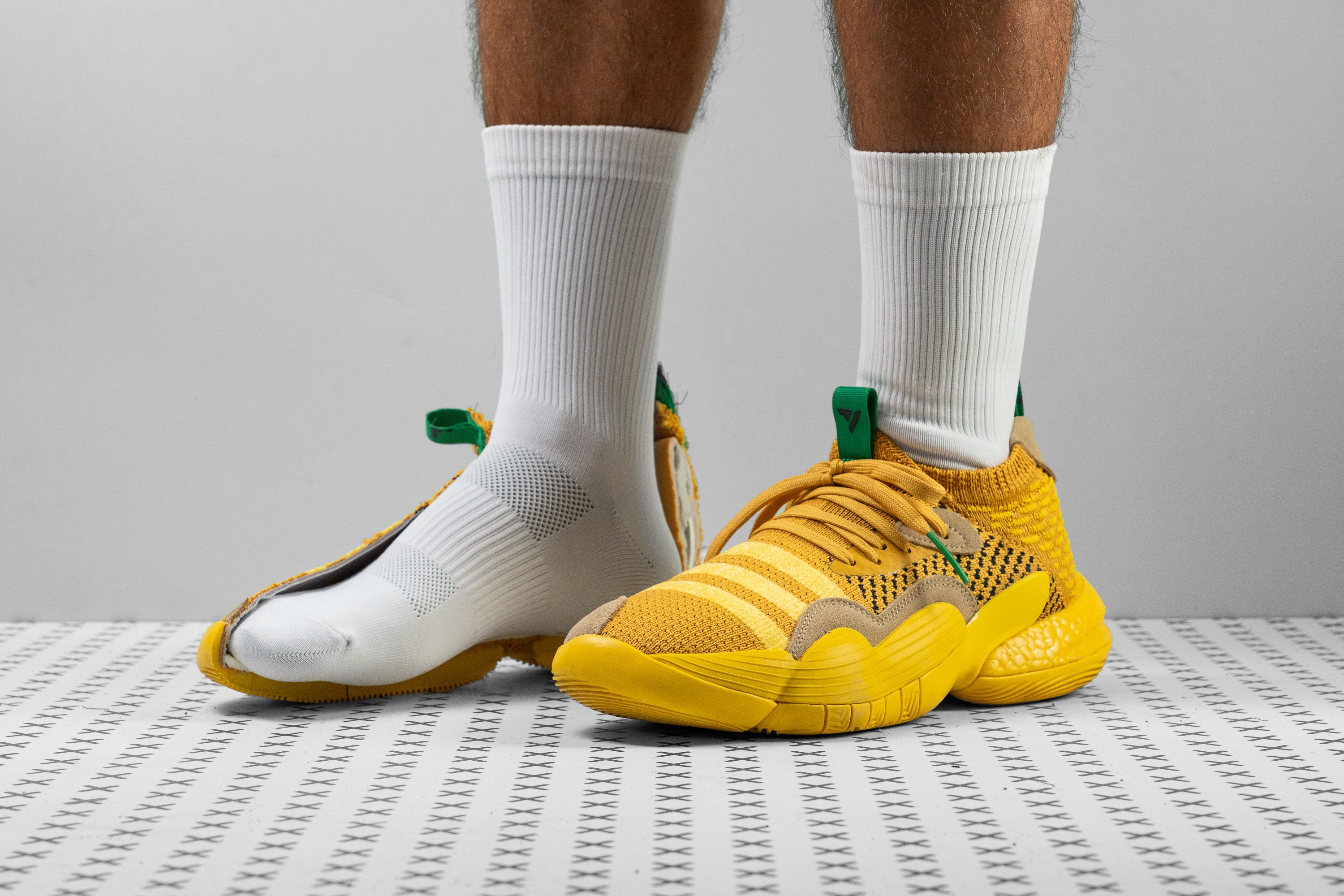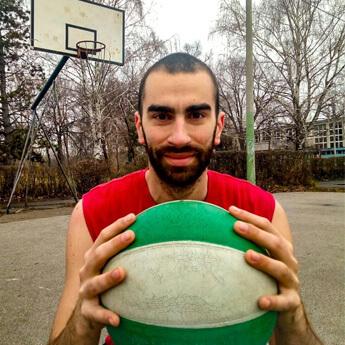Our verdict
- Top pick in best Adidas basketball shoes (2023)
Pros
- Amazing traction on clean courts
- Smooth heel-to-toe transition
- Very comfortable upper
- Super plush impact protection with Boost
- Good energy return
- Excellent support and lockdown
- Unique visual appearance
Cons
- Heavier than average
- Seriously hard to put on
- Not the best for outdoors
Audience verdict
Comparison
The most similar basketball shoes compared
+ + Add a shoe | |||||
|---|---|---|---|---|---|
| Audience score | 82 Good! | 90 Great! | 85 Good! | 88 Great! | |
| Price | $140 | $120 | $95 | $140 | |
| Signature | Trae Young | Donovan Mitchell | Damian Lillard | Trae Young | |
| Top | Low | Low | Low | Low | |
| Ankle support | ✗ | ✓ | ✓ | ✓ | |
| Weight lab | 14.8 oz / 420g | 13.8 oz / 390g | 14.3 oz / 404g | 15 oz / 425g | |
| Lightweight | ✗ | ✓ | ✗ | ✗ | |
| Breathability | Moderate | Moderate | Warm | Moderate | |
| Outsole durability | Bad | Decent | Good | Good | |
| Drop lab | 10.6 mm | 8.9 mm | 9.8 mm | 8.9 mm | |
| Heel stack lab | 32.1 mm | 30.3 mm | 30.3 mm | 29.6 mm | |
| Forefoot | 21.5 mm | 21.4 mm | 20.5 mm | 20.7 mm | |
| Size | Slightly small | Slightly small | True to size | True to size | |
| Midsole softness | Soft | Balanced | Balanced | Balanced | |
| Stiffness | Stiff | Stiff | Stiff | Stiff | |
| Torsional rigidity | Stiff | Stiff | Stiff | Stiff | |
| Heel counter stiffness | Moderate | Flexible | Moderate | Moderate | |
| Width / fit | Narrow | Wide | Wide | Medium | |
| Toebox width | Narrow | Narrow | Wide | Medium | |
| Midsole width - forefoot | Wide | Narrow | Average | Wide | |
| Midsole width - heel | Wide | Average | Average | Very wide | |
| Heel padding durability | Decent | Decent | Good | Decent | |
| Toebox durability | Good | Decent | Decent | Decent | |
| Insole thickness | Average | Average | Average | Average | |
| Outsole hardness | Average | Average | Average | Hard | |
| Outsole thickness | Average | Average | Average | Average | |
| Heel tab | Finger loop | Finger loop | Finger loop | Finger loop | |
| Ranking | #79 Bottom 10% | #10 Top 19% | #34 Bottom 37% | #25 Top 47% | |
| Popularity | #75 Bottom 14% | #44 Bottom 18% | #46 Bottom 14% | #42 Bottom 22% |
Who should buy
Having thoroughly tested this Adidas shoe, we believe that it could be a good match for the following:
- quick guards and athletes who share Trae Young's playing style (very agile with sudden direction changes)
- fans of knit uppers that feel like an extension of one's foot
- players who love plush cushioning in the heel (courtesy of Adidas Boost)
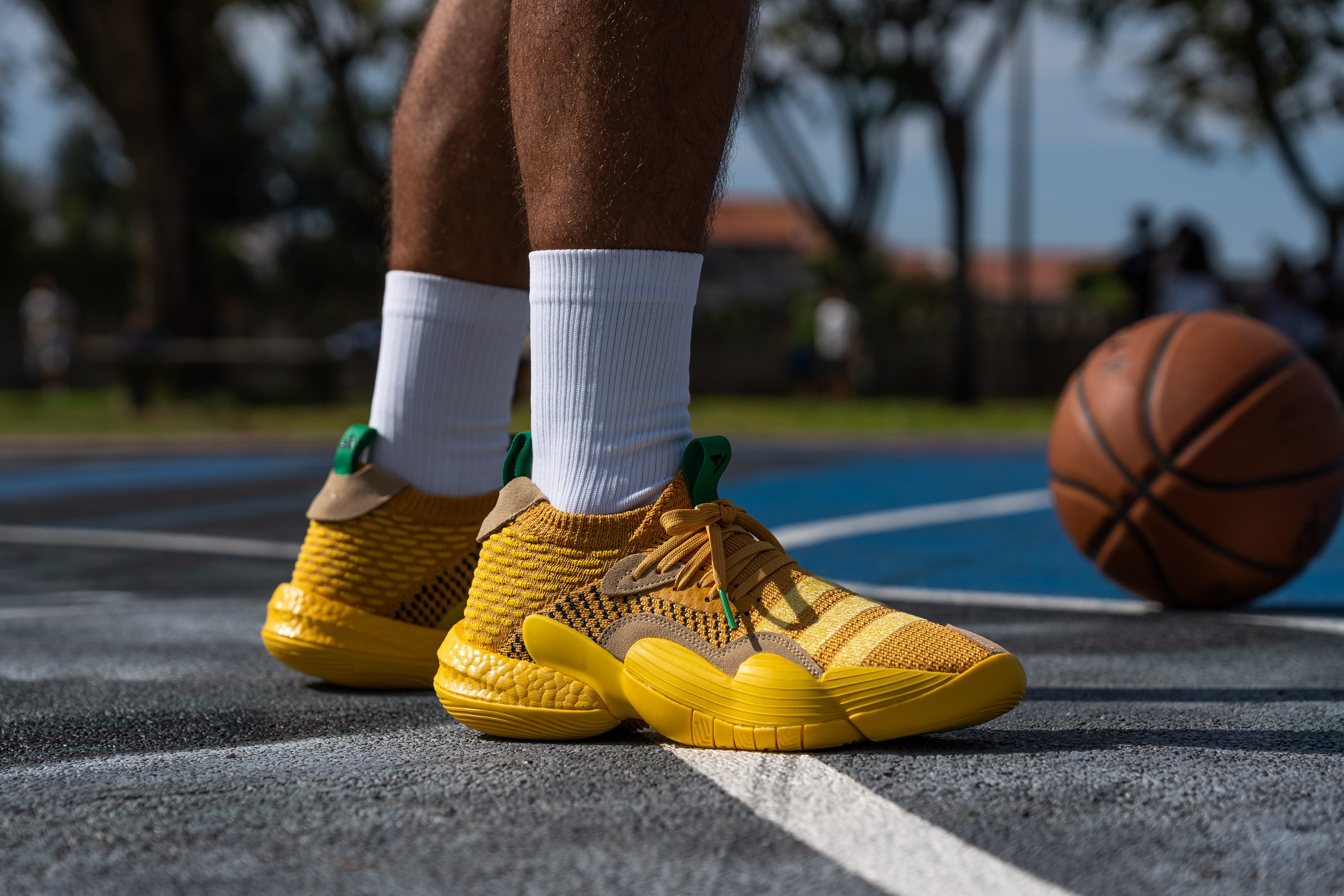
Who should NOT buy
We can see how people with wide feet, high arches, or mobility issues will have a really hard time getting this Adidas shoe on. The Adidas Harden Vol. 7 also has a sock-like upper but with a much more forgiving collar.
The Trae Young 2 is also not the best option for dusty and outdoor courts. We recommend Nike shoes like the Cosmic Unity 3 and the LeBron NXXT GEN for these playing conditions.
The above-mentioned LeBron shoe is also 1.5 oz (43g) lighter than the Adidas Trae Young 2.
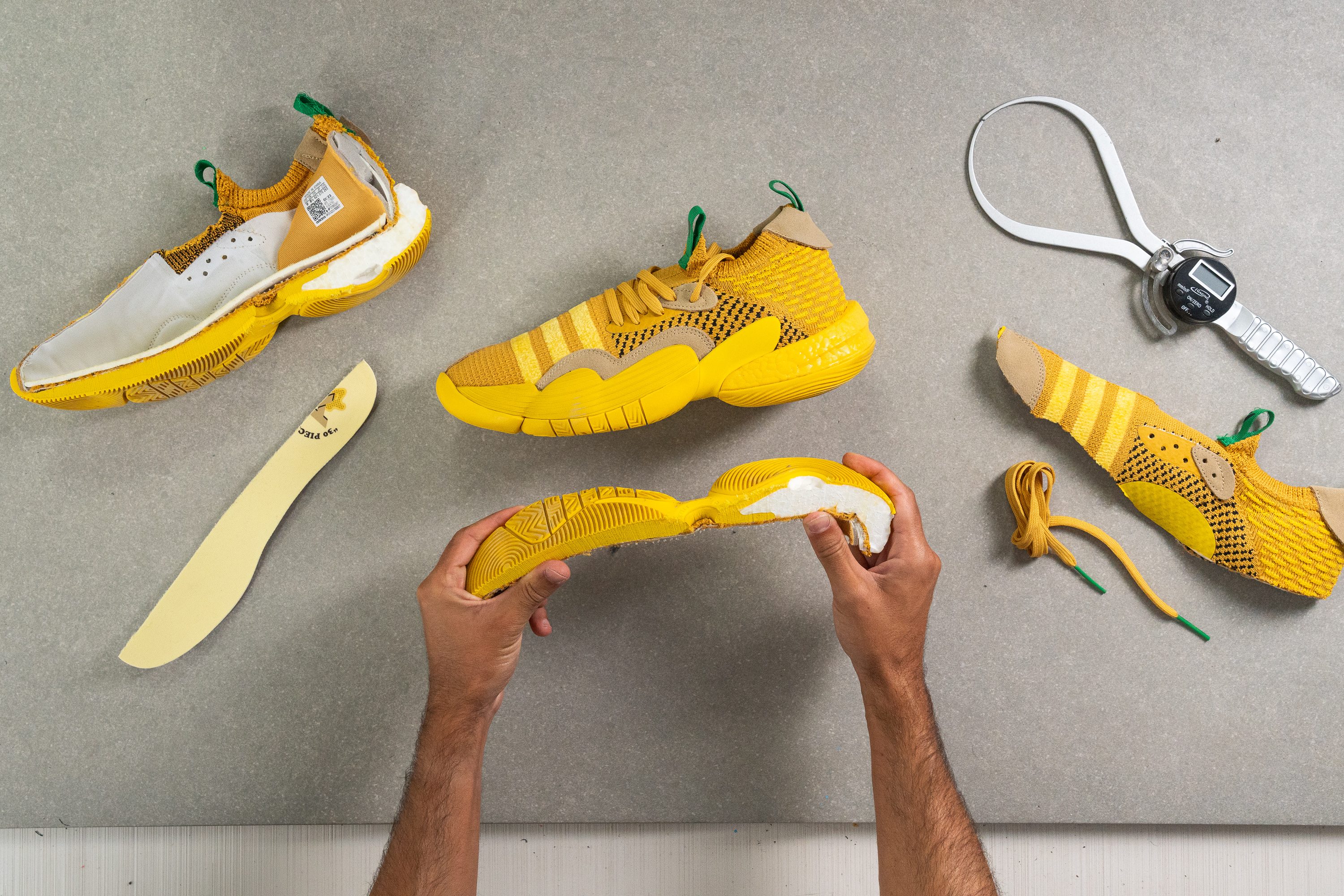
Cushioning
Heel stack
If we had to name just one reason to get this Adidas Trae Young shoe, it would definitely be its impact protection.
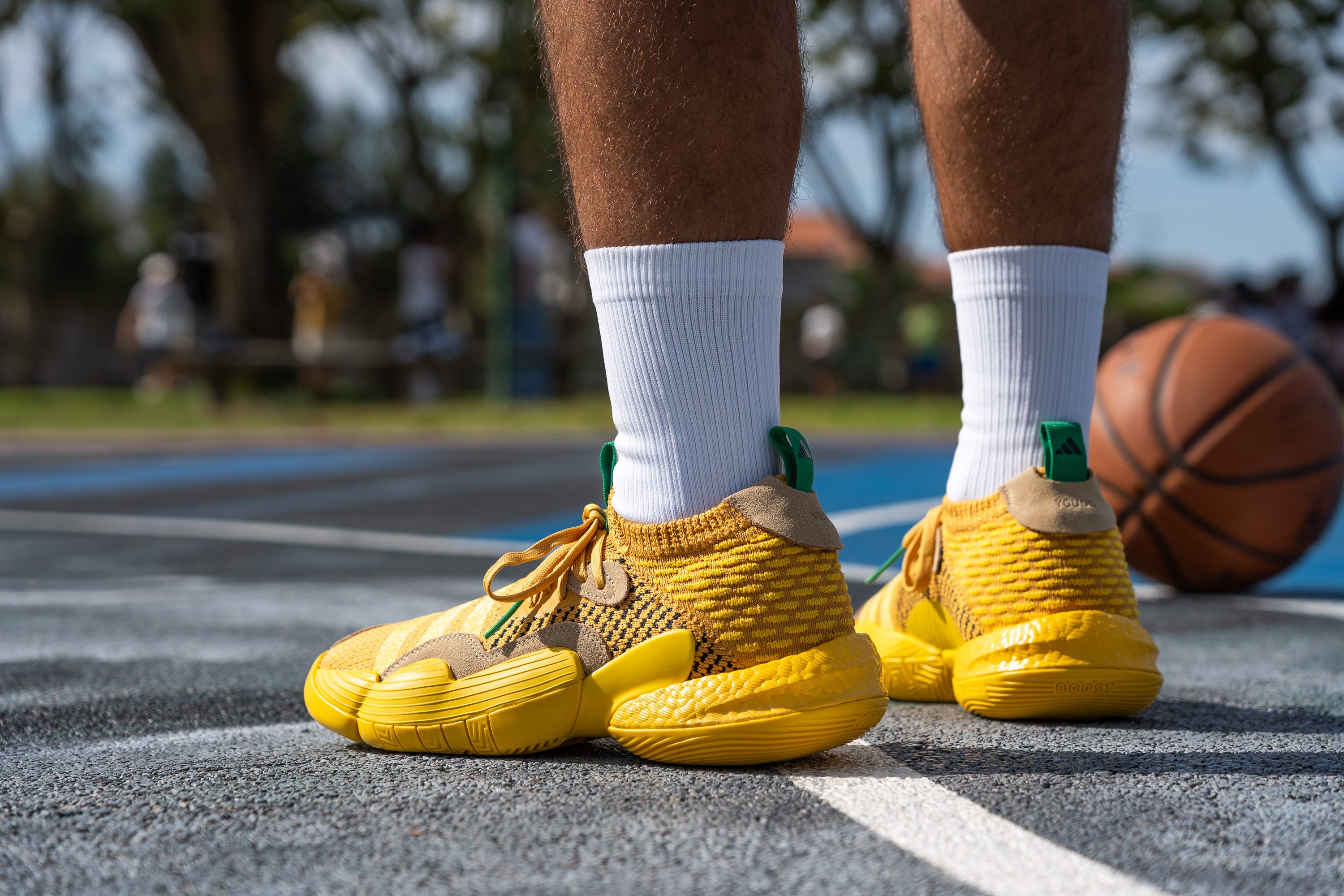
The slab of Boost foam at the heel is quite generous leading to a stack height of 32.1 mm. On paper, that's only about 2 mm above average but on the court, it feels immensely pampering and protective.
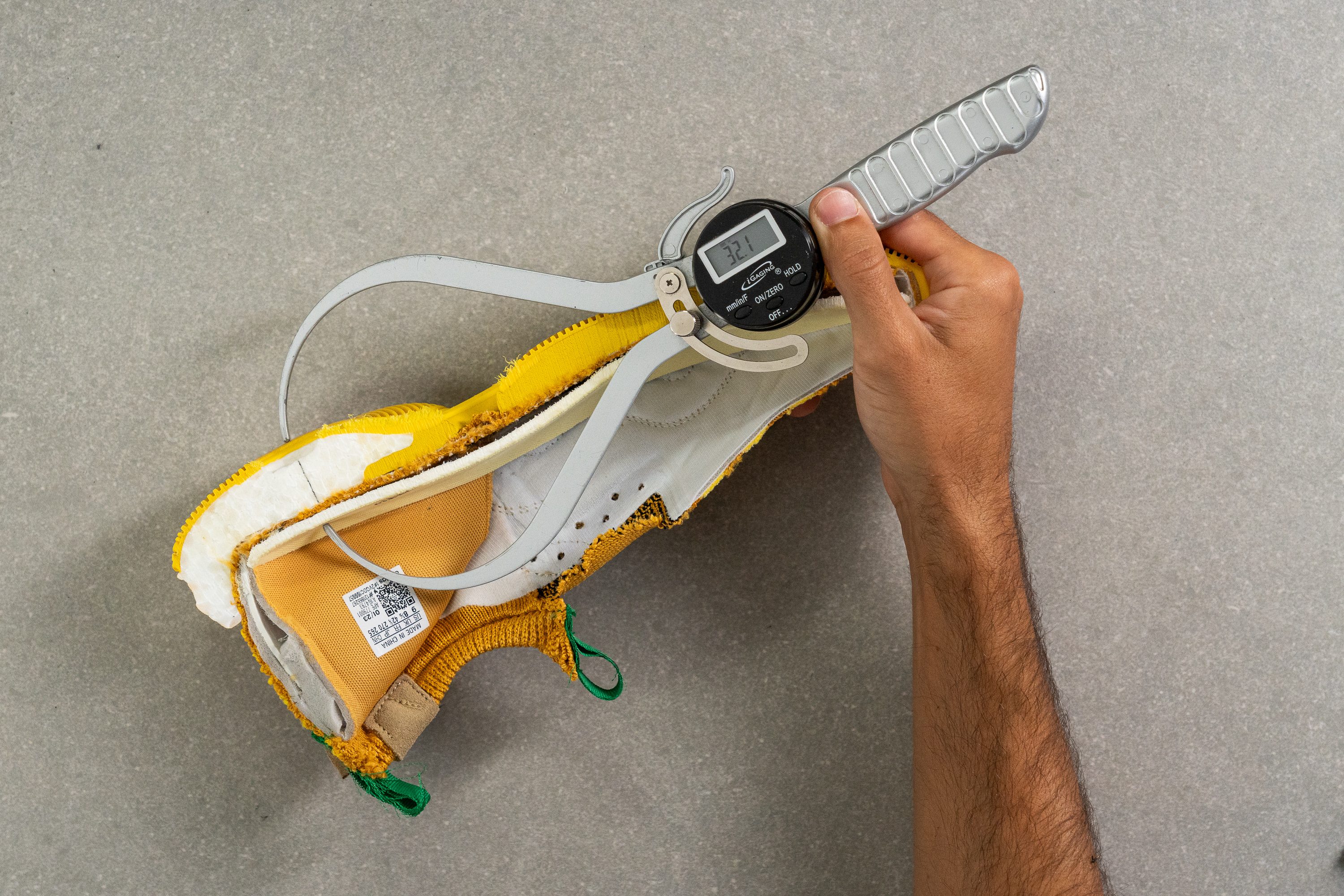
| Trae Young 2 | 32.1 mm |
| Average | 28.8 mm |
Forefoot stack
As for the forefoot, the Lightsrike foam layer comes in at 21.5 mm, based on our caliper measurement. This is right about the same as the average.
Nothing to write home about.
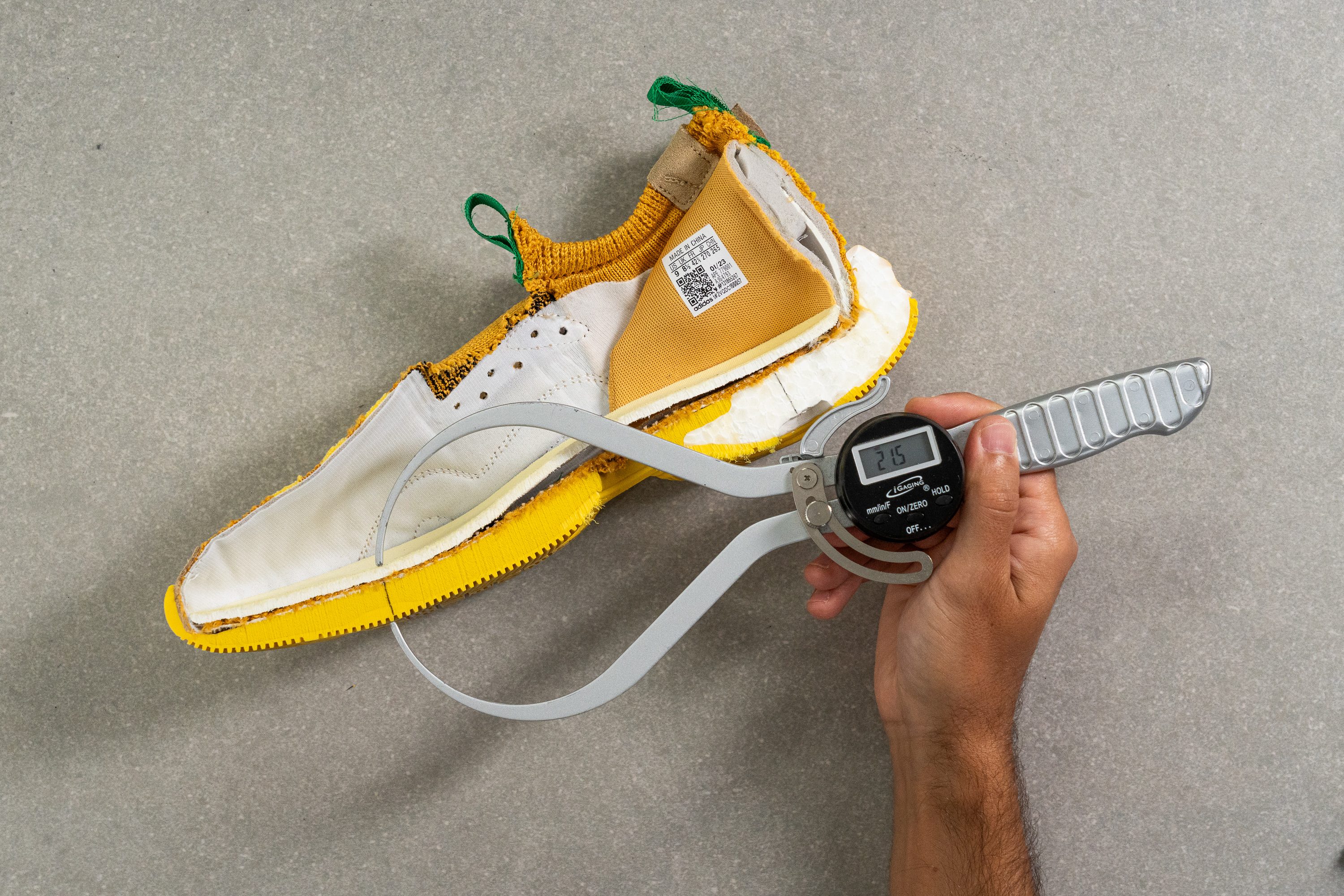
| Trae Young 2 | 21.5 mm |
| Average | 21.4 mm |
Drop
The difference in stack heights gives us a 10.6 mm drop. Being slightly taller than average, it clearly shows how this Trae Young shoe is more biased towards heel cushioning.
Explosive players who land a lot on their heels are sure to appreciate this setup.
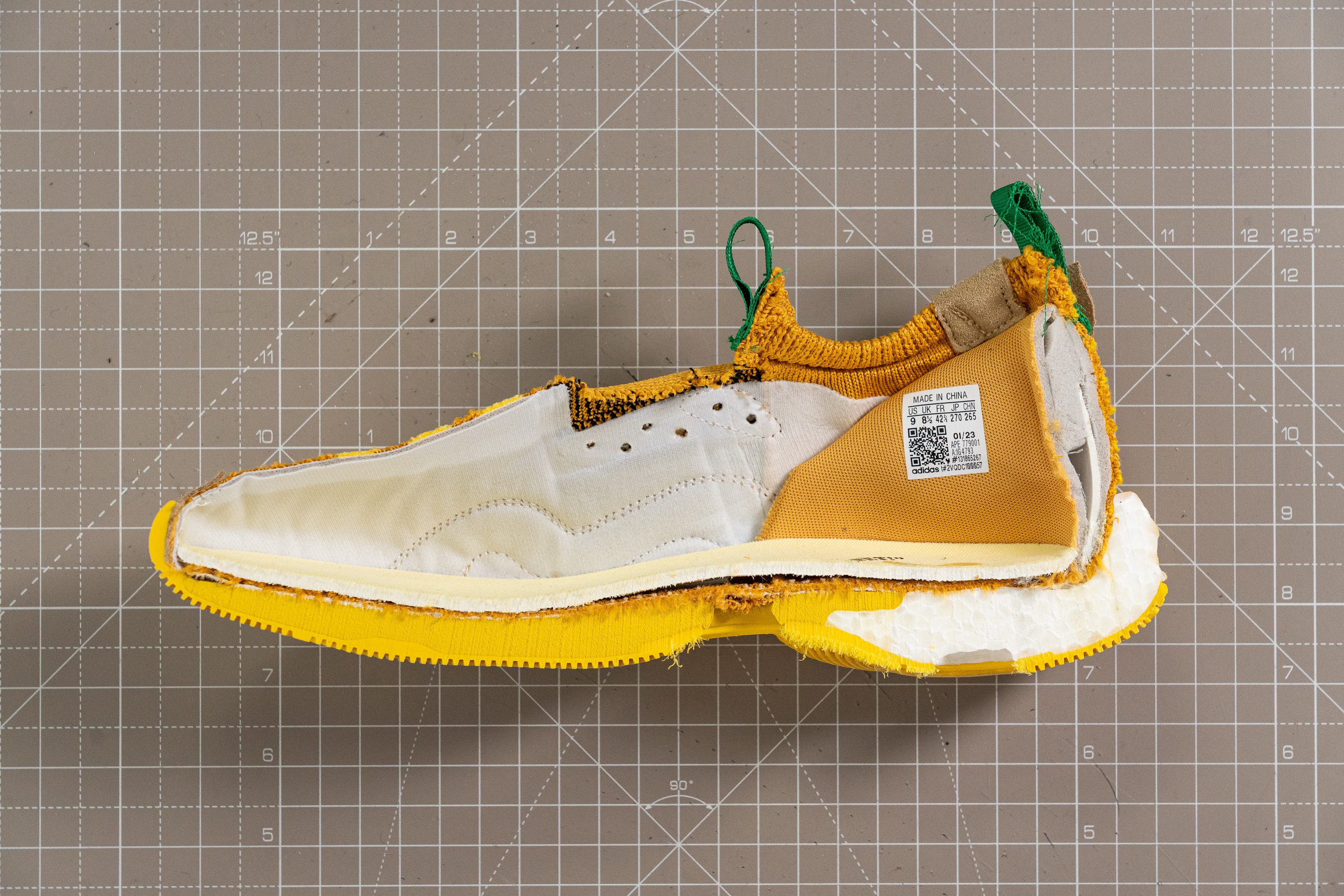
| Trae Young 2 | 10.6 mm |
| Average | 7.4 mm |
Midsole softness
During our playtests, we couldn't help but notice how plush and shock-absorbing the Boost cushioning was!
Using our trusty durometer to check the foam's softness, we got a mind-blowing reading of 11.5 HA! In normal people speak, this means 131% softer than average! Unbelievable!
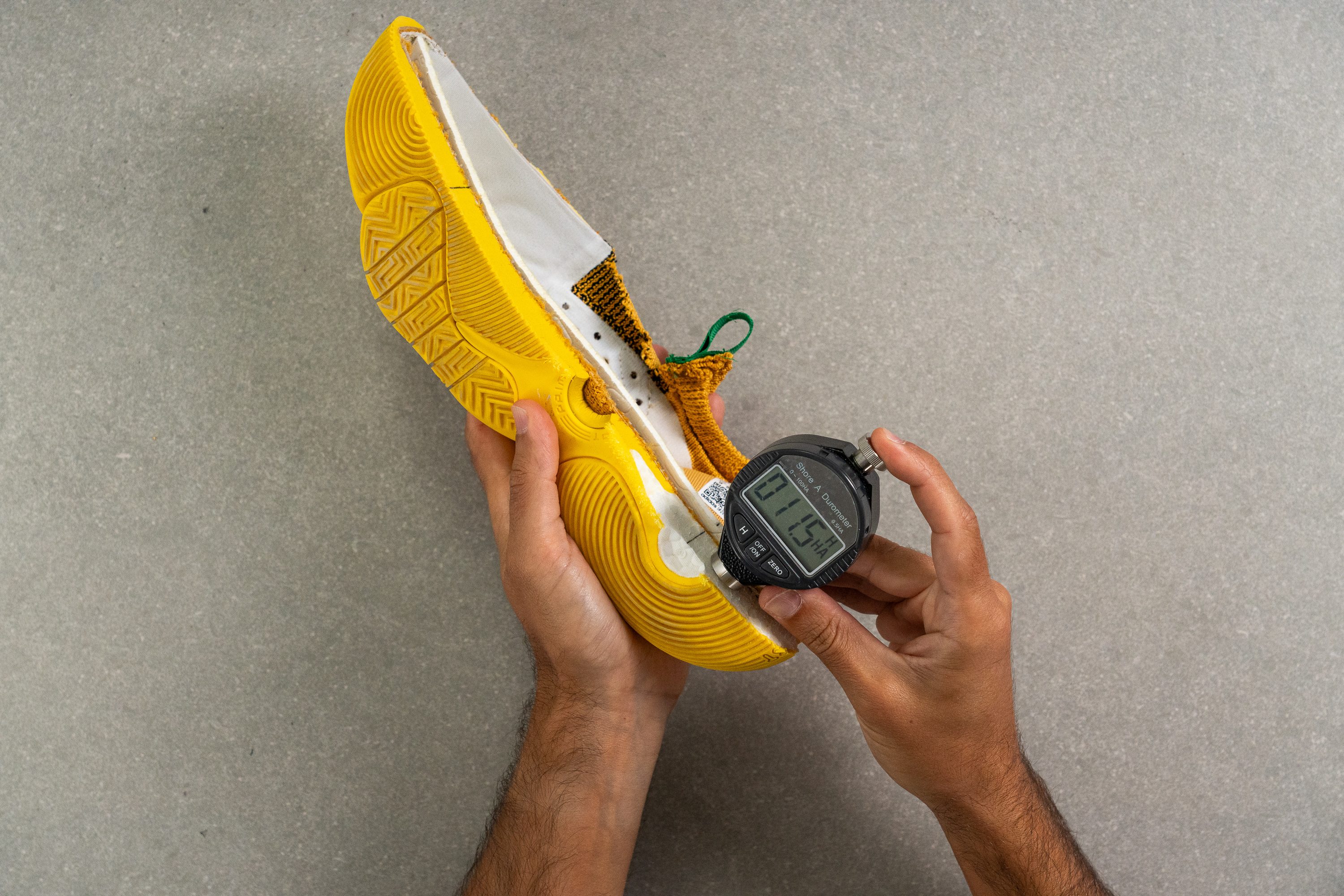
| Trae Young 2 | 11.5 HA |
| Average | 24.3 HA |
Secondary foam
As you can probably tell from the video above, the shoe's forefoot cushioning is not as plush and compressive.
The Lightstrike used here is notably firmer, with a durometer measurement of 22.5 HA. That is the same balance of softness and firmness as we see in most hoop shoes.
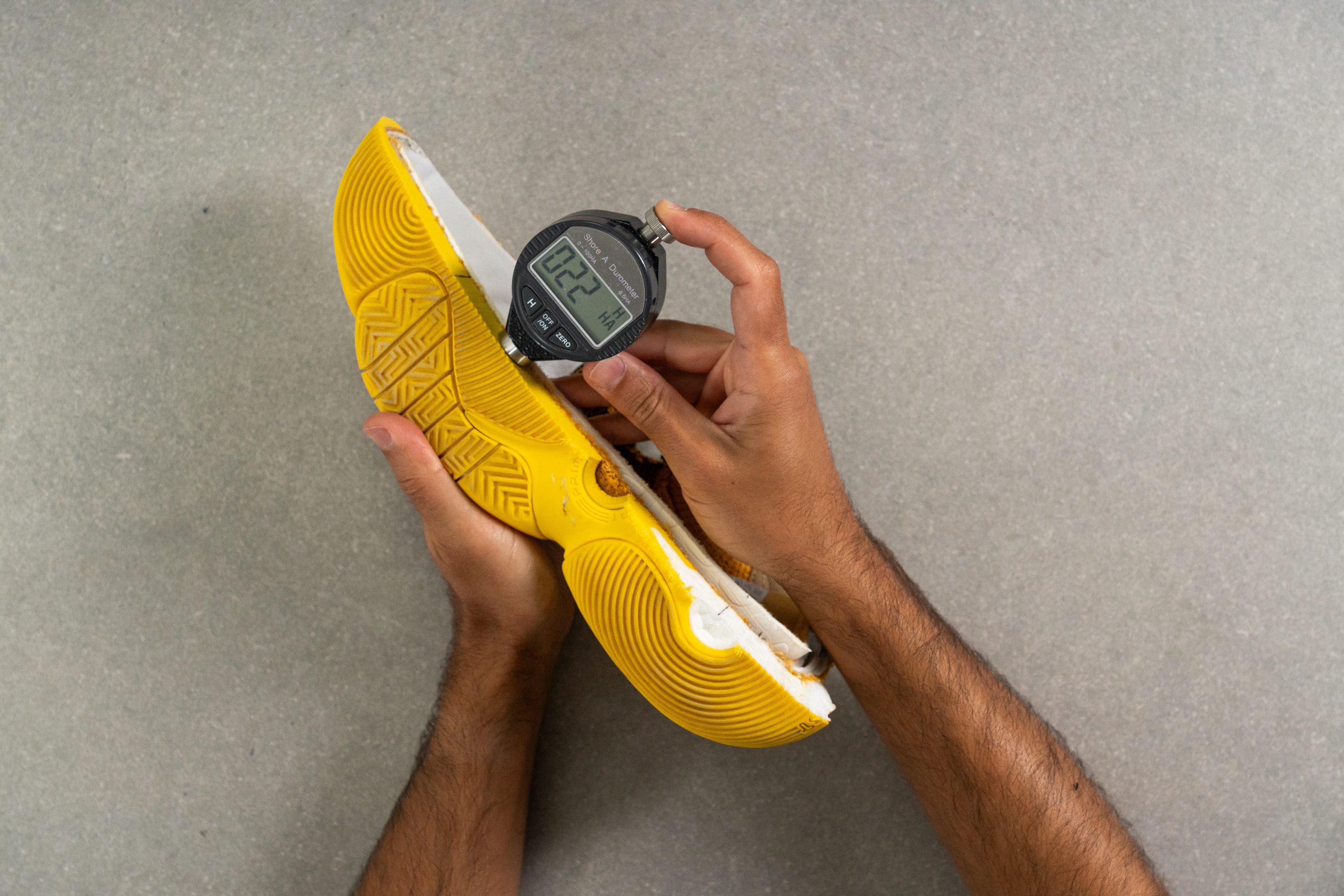
Having a firmer type of foam in the midfoot and forefoot certainly helps the shoe feel more stable. It also adds a bit of bounce for jumps.
| Trae Young 2 | 22.5 HA |
| Average | 27.7 HA |
Size and fit
Size
Adidas Trae Young 2 fits slightly small (23 votes).
Internal length
| Trae Young 2 | 269.4 mm |
| Average | 271.7 mm |
Width / Fit
Do take these measurements with a grain of salt given the shoe's knit upper.
If we were to trust our caliper reading only (92.6 mm in the widest part of the forefoot), this Adidas shoe would be 8.5 mm narrower than average!
And yet, on foot, it is actually quite accommodating. So much so that it can even fit a wider foot! We also noticed that after a few times, the material breaks in and stretches even more.
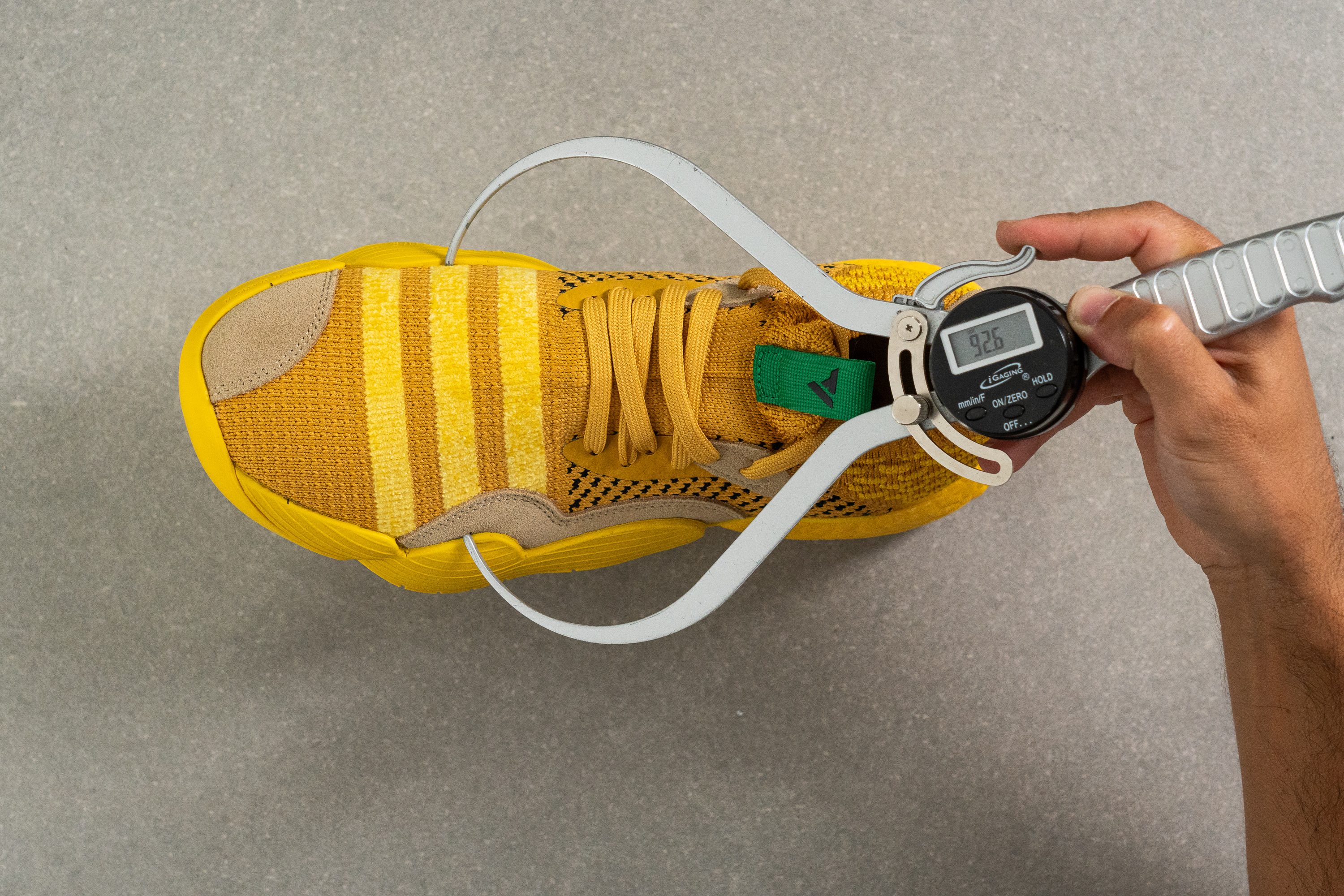
This test follows an older methodology, which is why you don't see recently tested shoes in the chart. Results from different methodologies can not be compared.
| Trae Young 2 | 92.6 mm |
| Average | 101.6 mm |
Toebox width
We also checked the toebox width around the big toe and the caliper returned 71.2 mm. Again, narrower than average but not an issue when actually worn on foot.
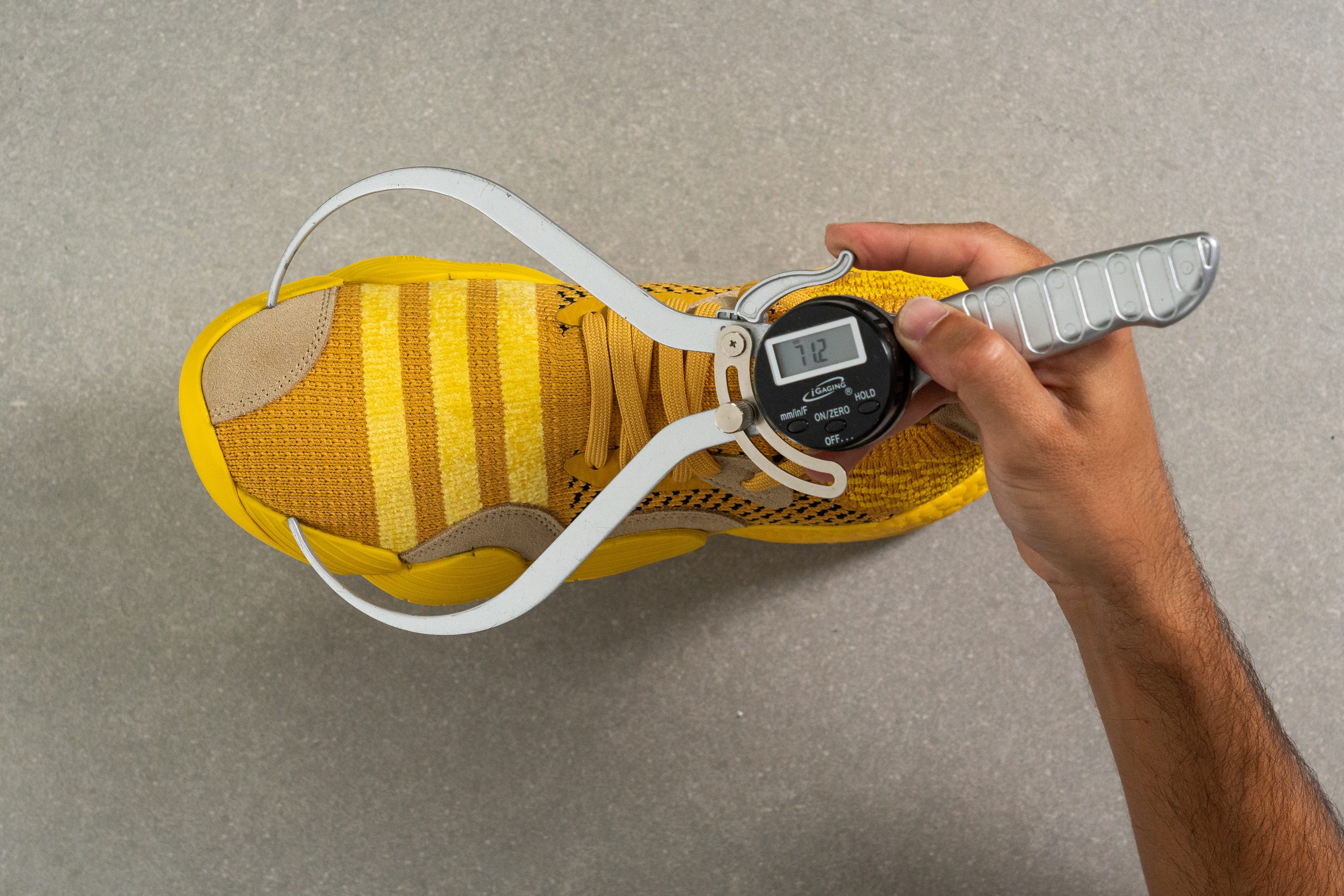
This test follows an older methodology, which is why you don't see recently tested shoes in the chart. Results from different methodologies can not be compared.
| Trae Young 2 | 71.2 mm |
| Average | 76.9 mm |
Lacing
The laces don't really do anything in this Adidas shoe because, well, it fits snug even without them.
Just be careful not to cinch the shoestrings down too tight because that will only add pressure to the already close-fitting experience.
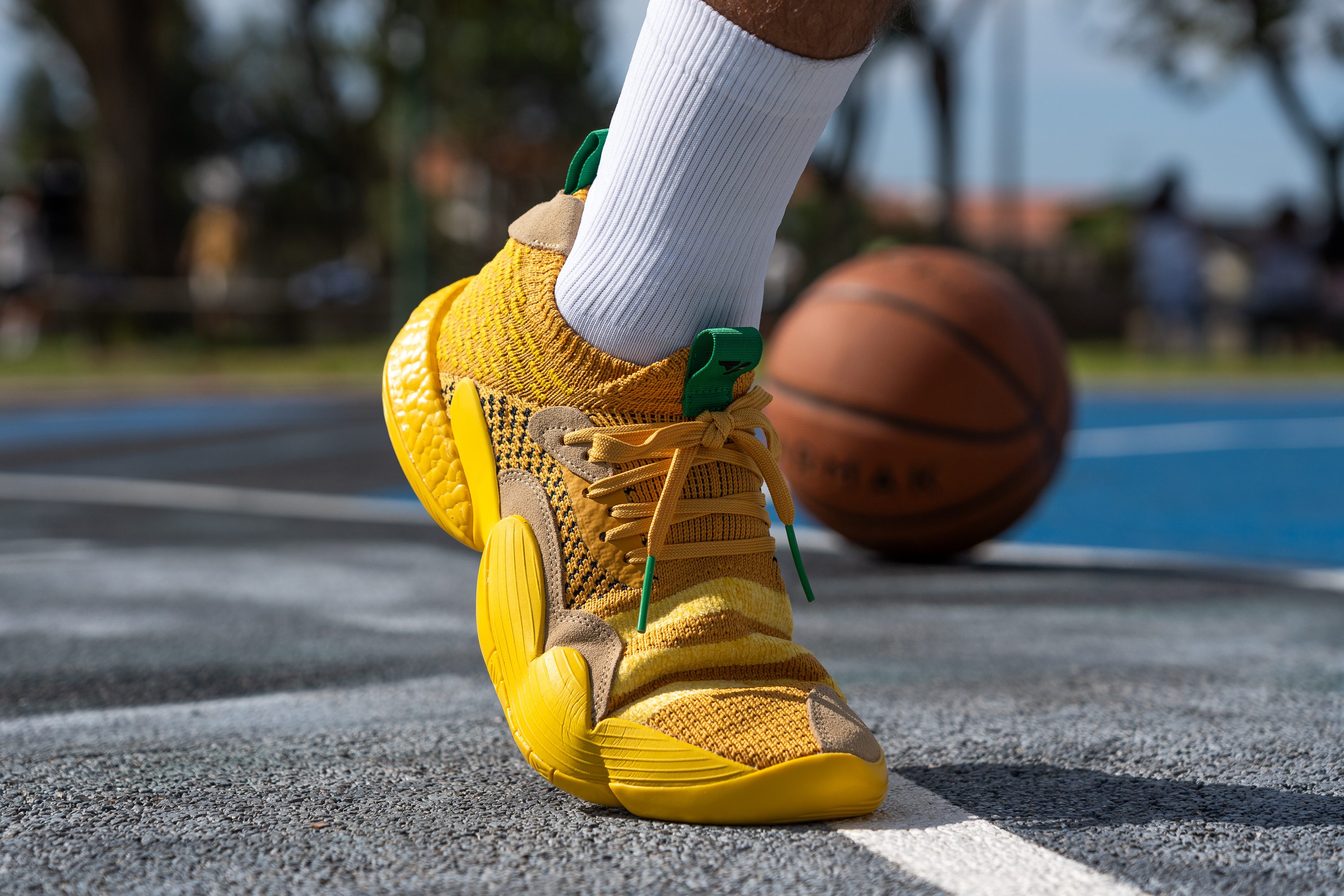
Flexibility / Stiffness
We really enjoyed the smooth and seamless heel-to-toe transitions of this Adidas shoe. They seem to be created by multiple factors:
- midsole curvature in the heel
- raised toe tip
- really good amount of forefoot flex
To measure the latter, we used a gauge that shows how much force it takes to bend this Adidas shoe to a 90-degree angle. Turns out, much less than average! It required only 31.4N which is 30% less than it takes a typical basketball shoe.
Apparently, freedom of movement is a must for Trae Young's feet!
This test follows an older methodology, which is why you don't see recently tested shoes in the chart. Results from different methodologies can not be compared.
| Trae Young 2 | 31.4N |
| Average | 38.8N |
Weight
Given that it was designed in collaboration with Trae Young, we did expect a lightweight and speedy shoe.
Unfortunately, this was not the case. According to our scale measurement, this Adidas shoe comes in at 14.8 oz (420g) in a men's US size 9. That's half an ounce heavier than the average basketball shoe in our lab.
On a lighter note, the Trae Young 2 is not as heavy as the Adidas Harden Vol. 7 (16.5 oz).
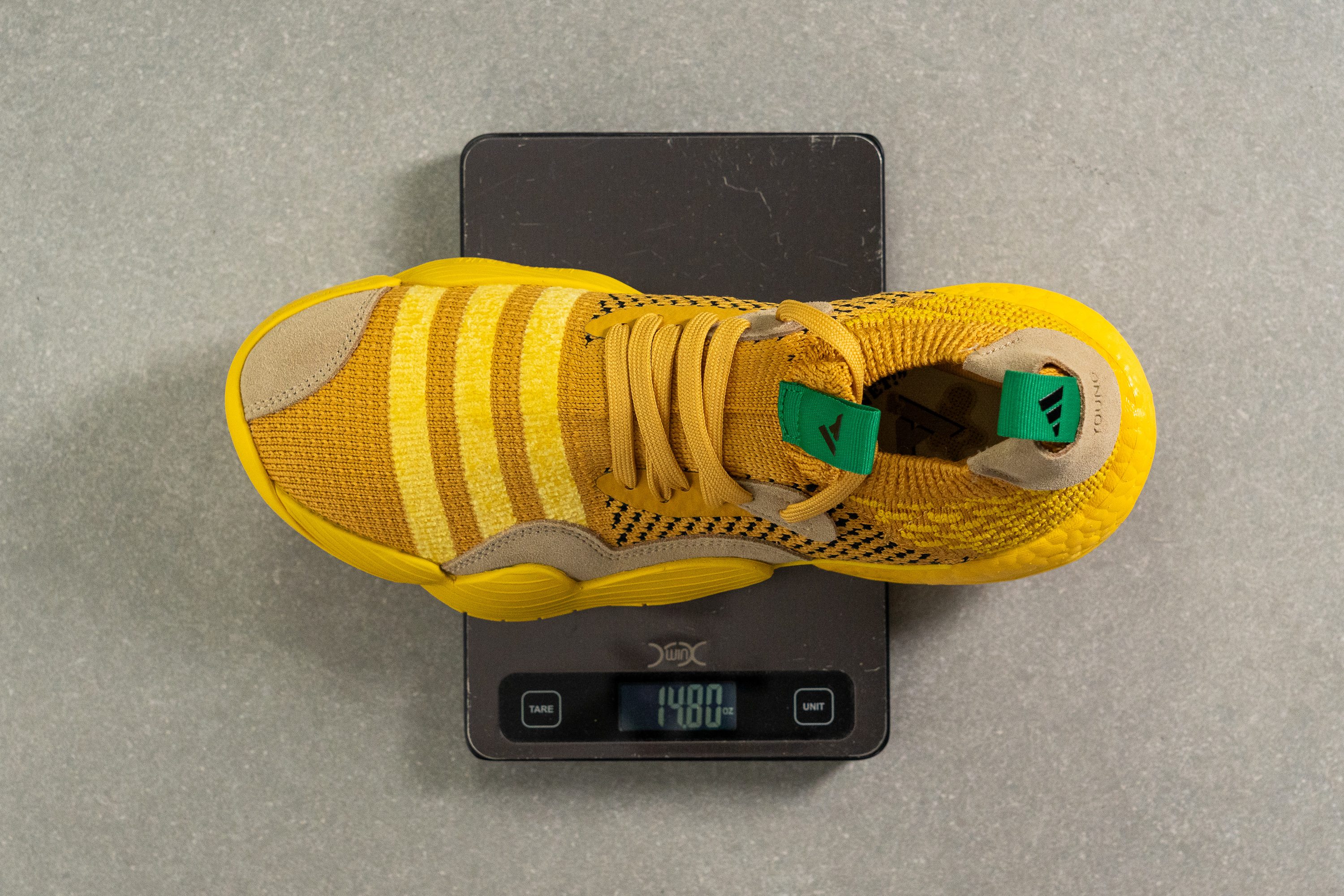
| Trae Young 2 | 14.8 oz (420g) |
| Average | 13.8 oz (391g) |
Breathability
What can we say, the shoe's Primeknit upper looks like a sweater and certainly feels like one! So the fact that it had decent breathability was a nice surprise to us.
Putting this Adidas shoe to our demonstrative smoke test, we found that it is pretty stuffy in the toebox but still lets the air pass through the instep area.
This convinced us to give the shoe's breathability a balanced score of 3 out of 5. It is not ideal for a hot summer session but has more airflow than basketball shoes on average.
To support our findings in the smoke-pumping machine test, we also put the shoe's upper against bright light. This test clearly shows that the material is extra tightly woven in the toebox but is a little bit more transparent in the tongue.
And if you are wondering how "tightly woven" we are talking, our microscope shots help to demonstrate that very well.
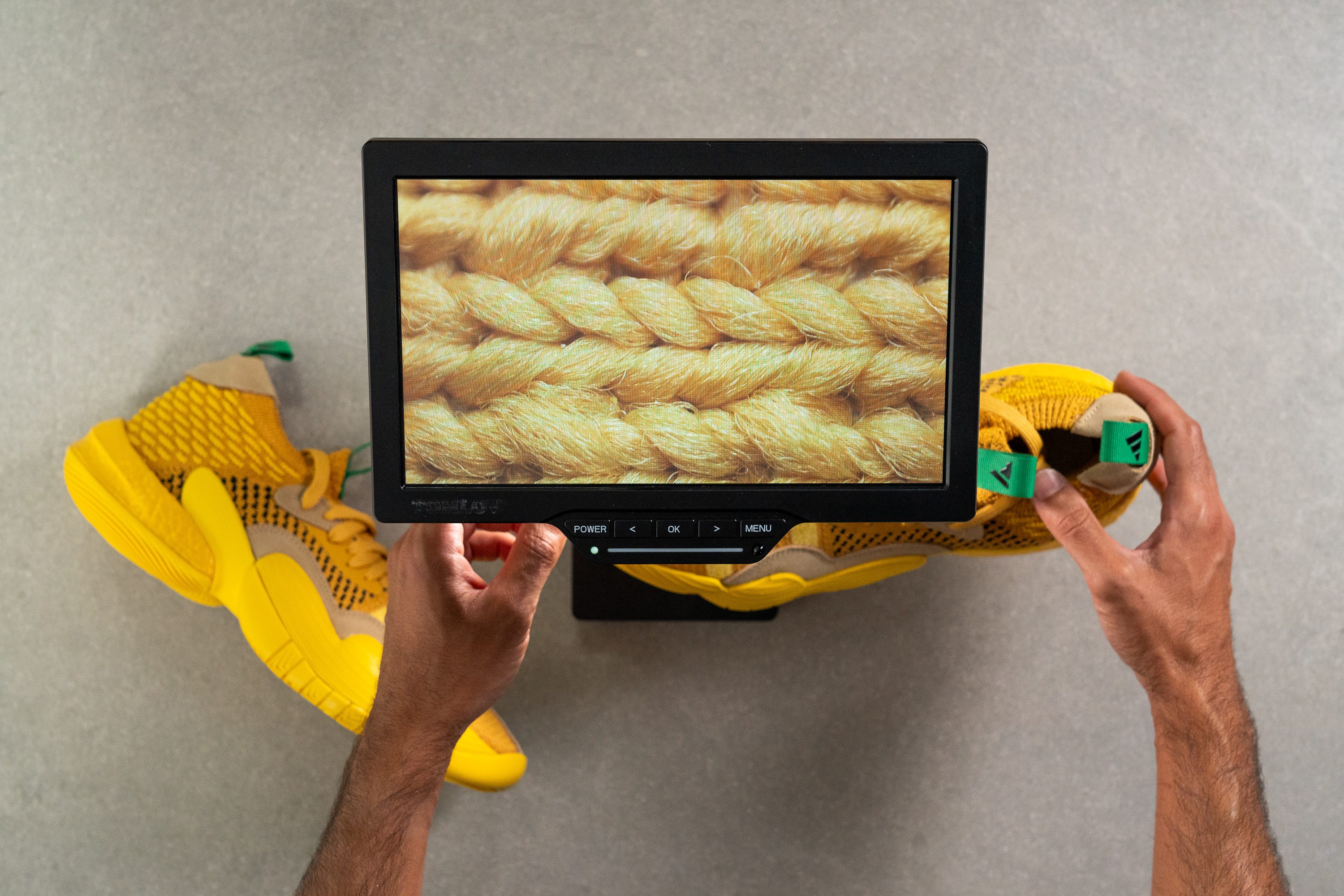
There are no defined ventilation holes in sight!
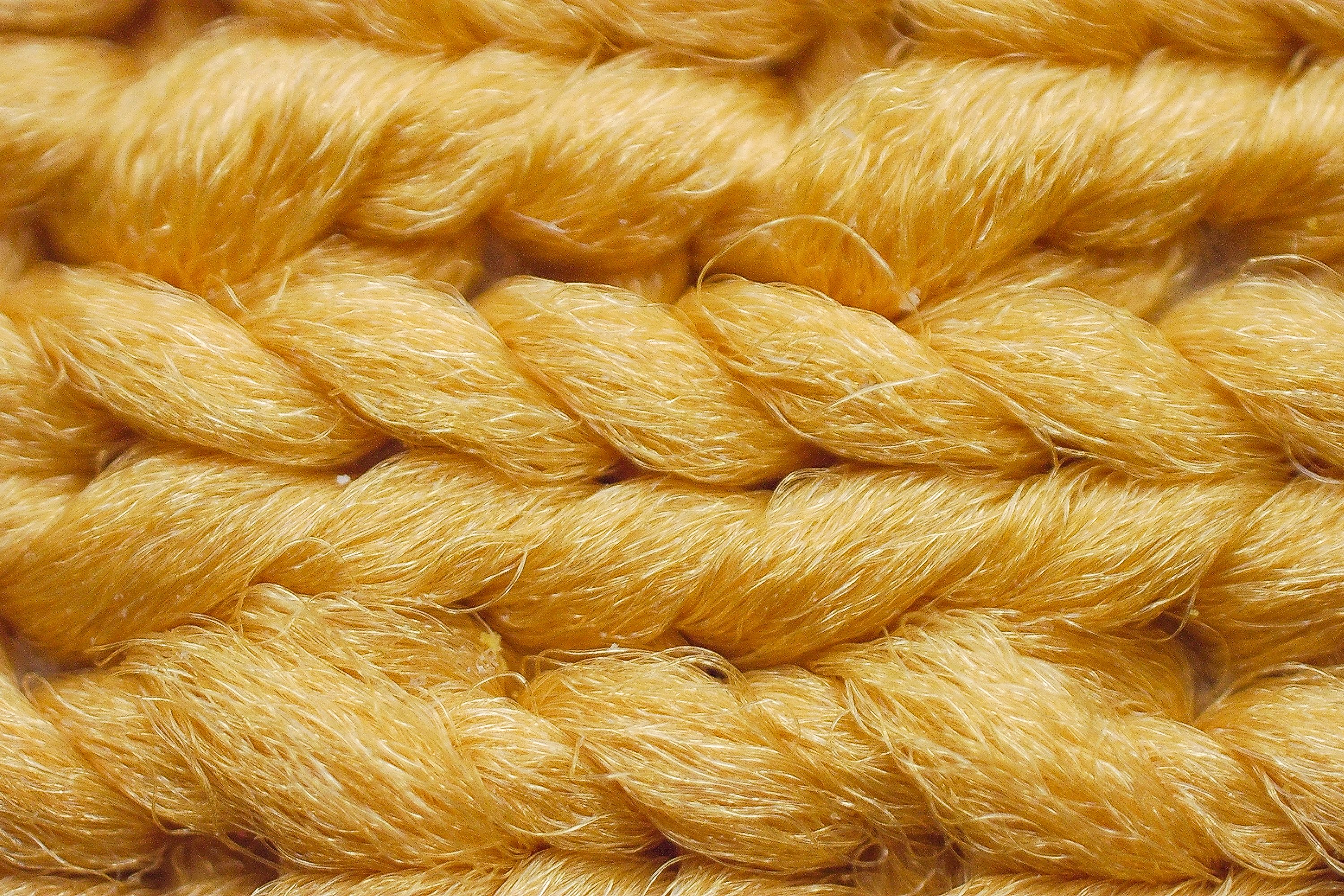
| Trae Young 2 | 3 |
| Average | 2.5 |
Stability
Lateral stability test
Despite all that plush cushioning in the heel, the Adidas Trae Young 2 felt impressively stable in our playtests! We must say that the shoe kept our feet securely in place at all times, even during the most intense movements.
Torsional rigidity
One major contributor to the shoe's supportive construction is of course the presence of a torsion plate in the midsole.
But in this Adidas shoe, it's more than just a linear shank. It is a strategically designed, firm, and sturdy TPU unit that extends outwards and to the sides of the platform, holding it firmly and not letting it twist.
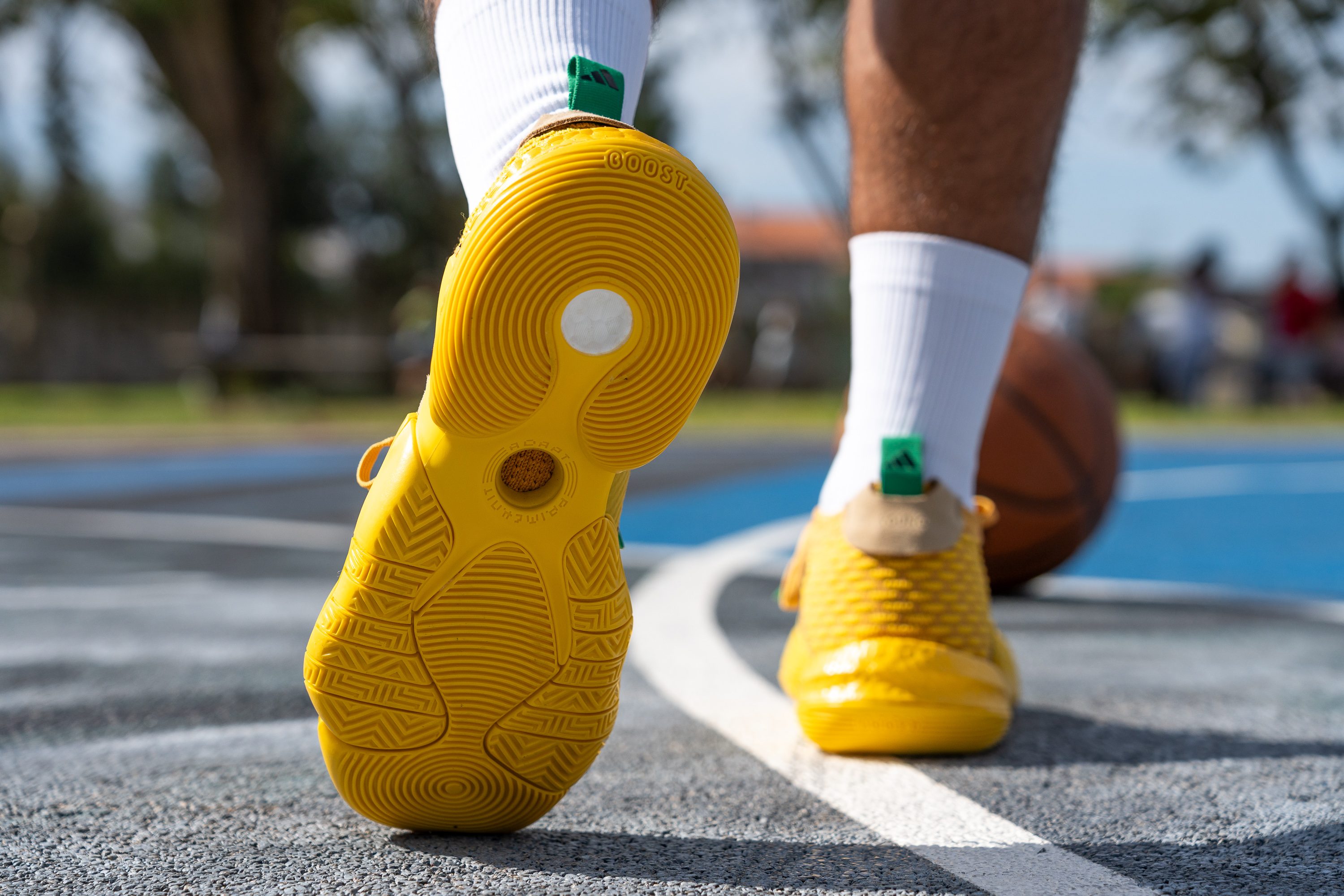
When we actually tried twisting the shoe in our hands, there was little-to-no give. Thus, we rated its torsional stiffness with the highest possible score - 5 out of 5. This rigidity really enhances the shoe's stability and helps to prevent a nasty ankle twist.
| Trae Young 2 | 5 |
| Average | 4.5 |
Heel counter stiffness
Seeing a knit upper always makes us a little suspicious of the shoe's foothold. However, Adidas came up with a pretty effective workaround here. Ankle pillows!
Having two generously padded units on both sides of the ankle proved to be very helpful in keeping it securely in place. They actually added some structural integrity to the rearfoot, convincing us to give a high score of 4 out of 5 for the shoe's heel counter stiffness. We experienced zero heel slips.
| Trae Young 2 | 4 |
| Average | 3.8 |
Midsole width - forefoot
What else makes the Adidas Trae Young 2 feel so stable? Its monstrously wide platform!
No seriously, this is by far the widest base we've seen in a basketball shoe! Measuring the widest part of the forefoot with a caliper, we got a whopping 122.2 mm! That's almost a centimeter wider than average!
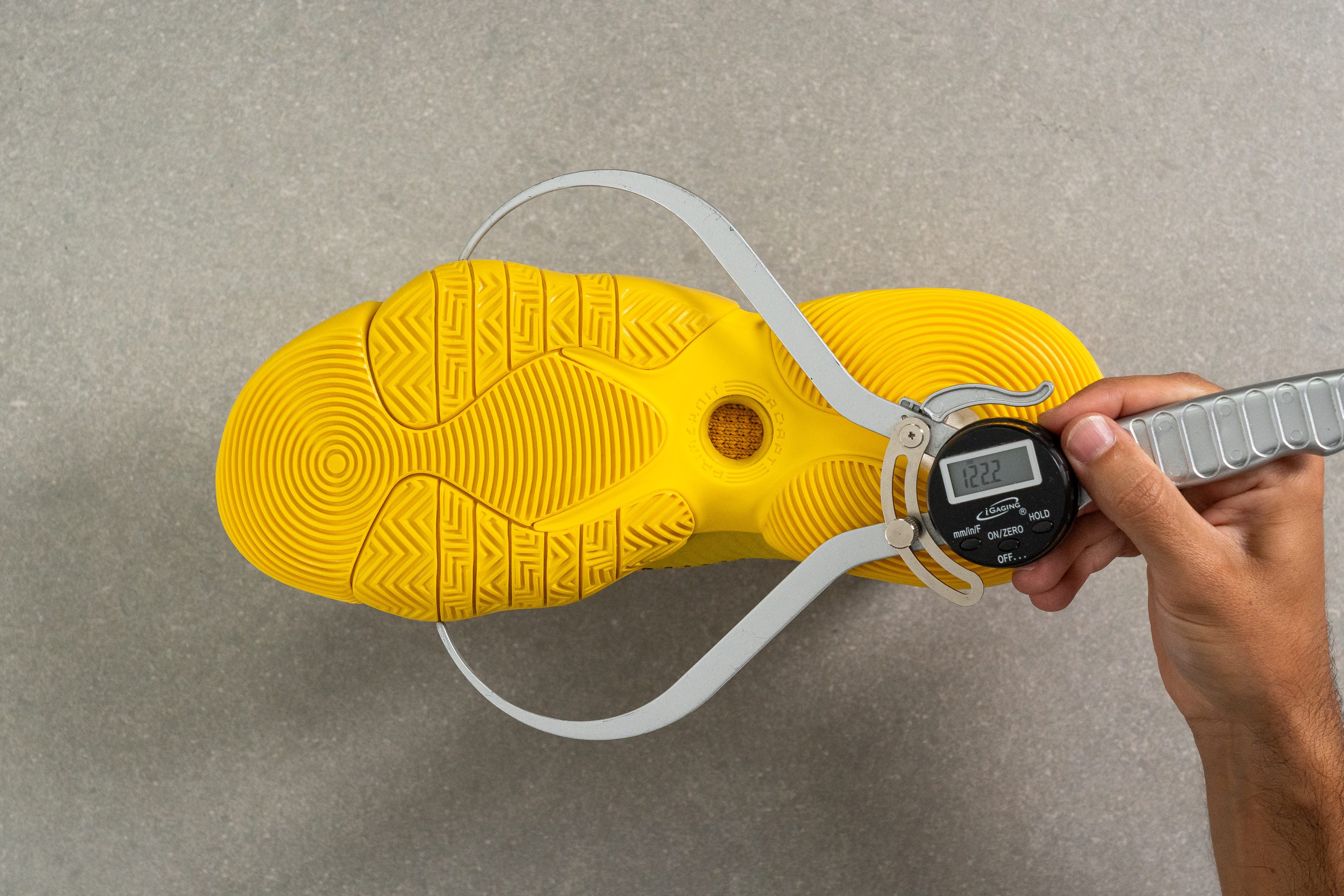
| Trae Young 2 | 122.2 mm |
| Average | 114.8 mm |
Midsole width - heel
But wait, it gets crazier in the heel.
In the widest part, our caliper showed 101.6 mm which is also a good centimeter wider than average. We can definitely see how Trae Young would want this kind of landing area for his lightning-quick direction changes.
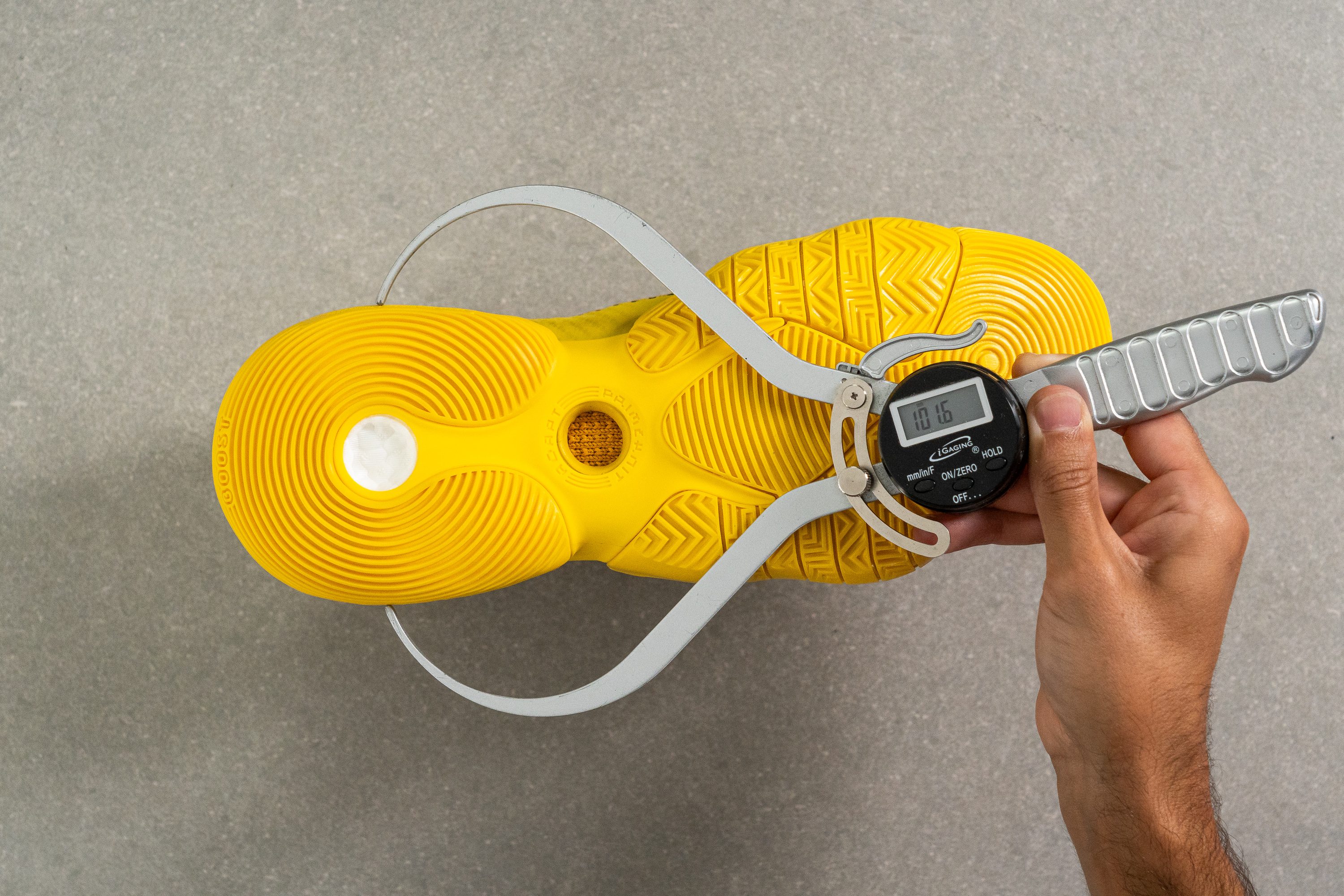
| Trae Young 2 | 101.6 mm |
| Average | 89.7 mm |
Durability
Toebox durability
But, fortunately, the lack of breathability is very well compensated for by the knit's wear resistance.
Drilling the shoe's toebox for a good 12 seconds at a 5K RPM speed, the material barely got any damage! And we didn't even drill it where the suede overlay is!
Getting a perfect score of 5 out of 5 for its toebox durability, the Trea Young 2 really stands out from the average basketball shoe. And it's not even made of synthetic leather!
In the comparison photo below, you can see how bad it can get when we put mesh uppers through the same Dremel test.
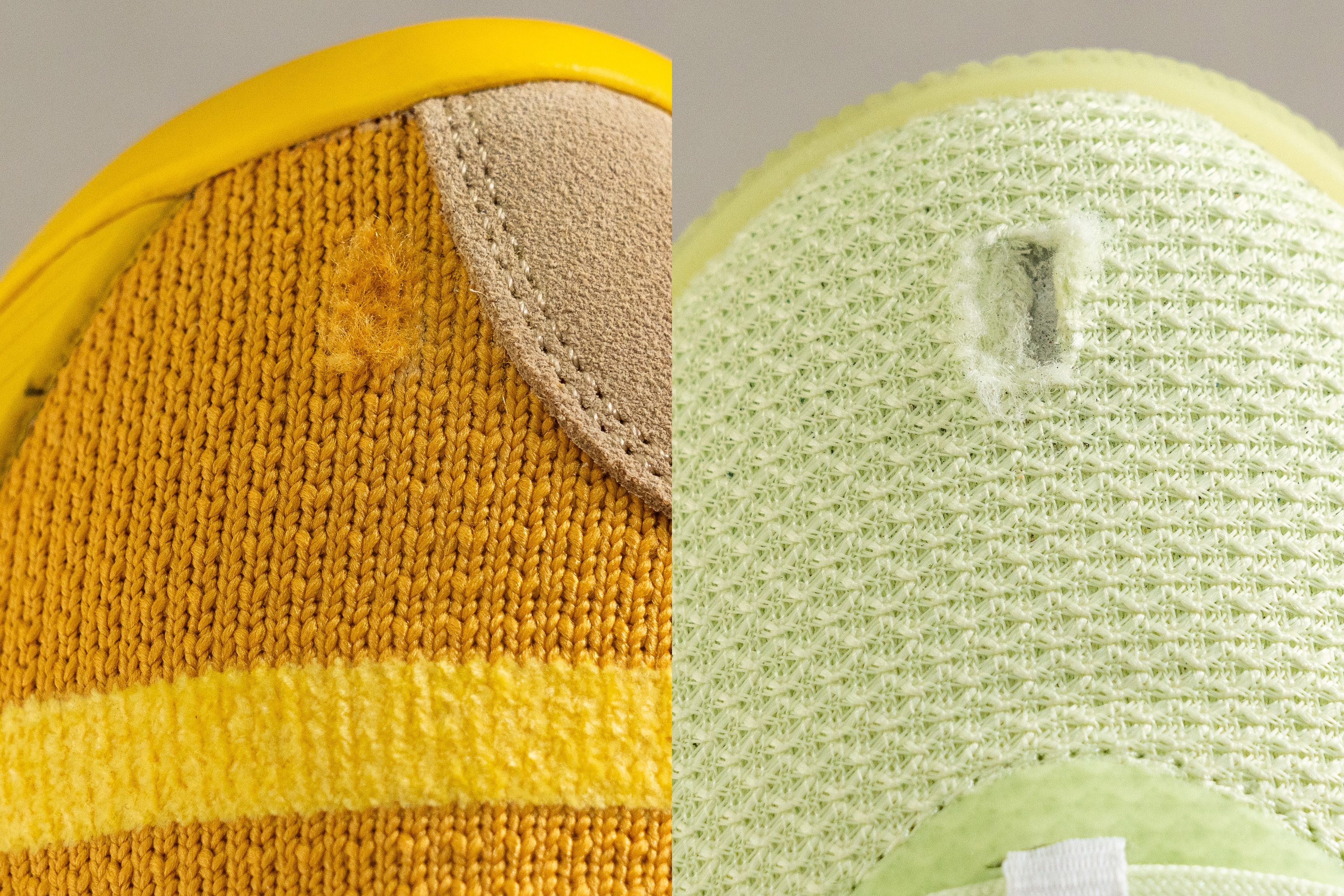
| Trae Young 2 | 5 |
| Average | 3.7 |
Heel padding durability
We also checked the durability of another sensitive upper area - the shoe's heel lining and padding.
That's where the Adidas Trae Young 2 did a pretty average job. Assessing the damage caused by 4 seconds of drilling, we rated its wear resistance as 3 out of 5. That's quite normal for a typical hoop shoe.
Although there is a caveat - with the amount of effort it takes to get this thing on our feet, we might as well tear the collar up in a few months! We'll talk more on that in the Size and it section.
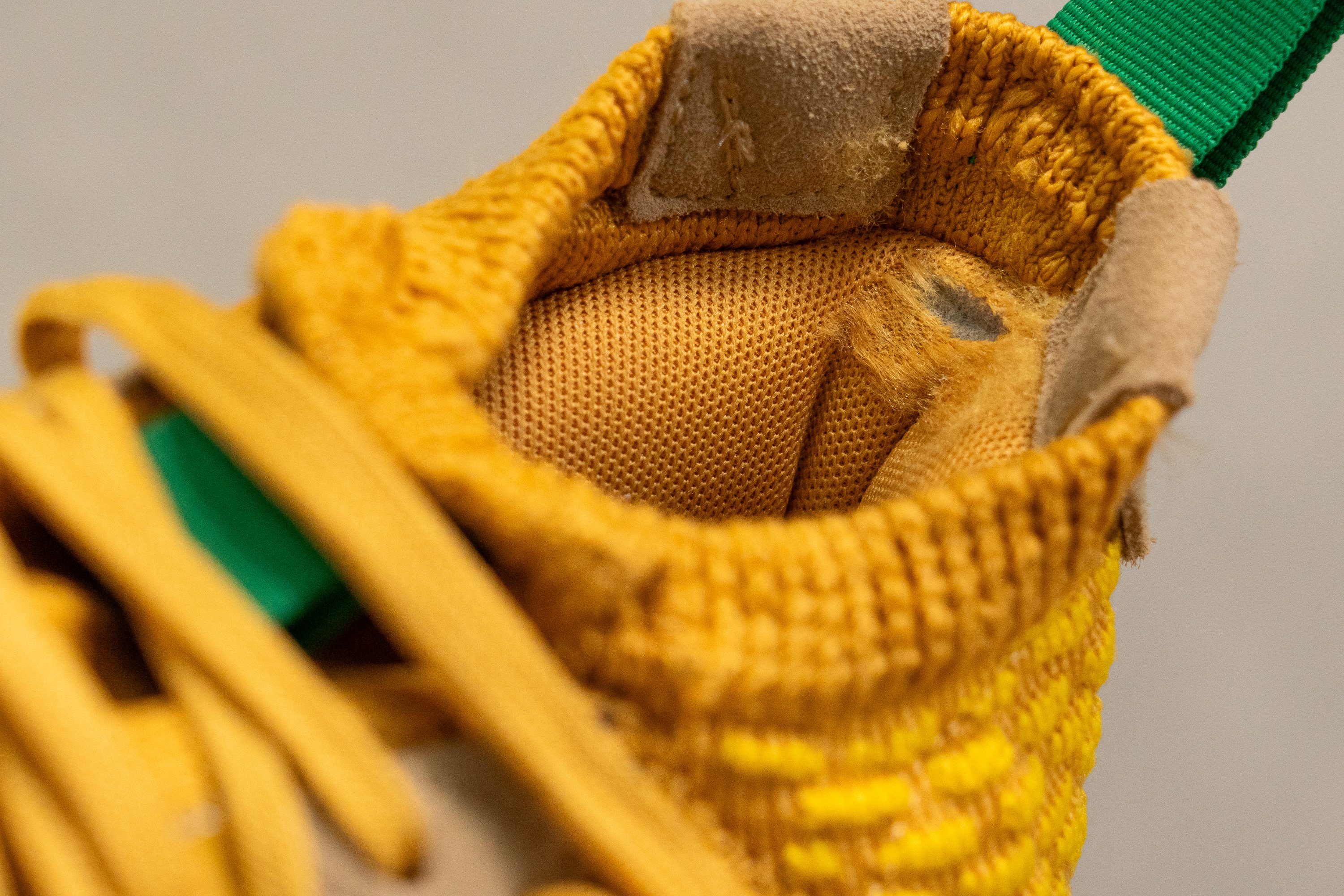
| Trae Young 2 | 3 |
| Average | 3.7 |
Outsole hardness
Feeling how hard the shoe's outsole rubber was gave us a lot of confidence in its durability. Initially.
Our experience was indeed proved by the durometer reading of 84.8 HC which is harder than average! But apparently, this wasn't enough to make the Adidas Trae Young 2 a solid outdoor-ready option.
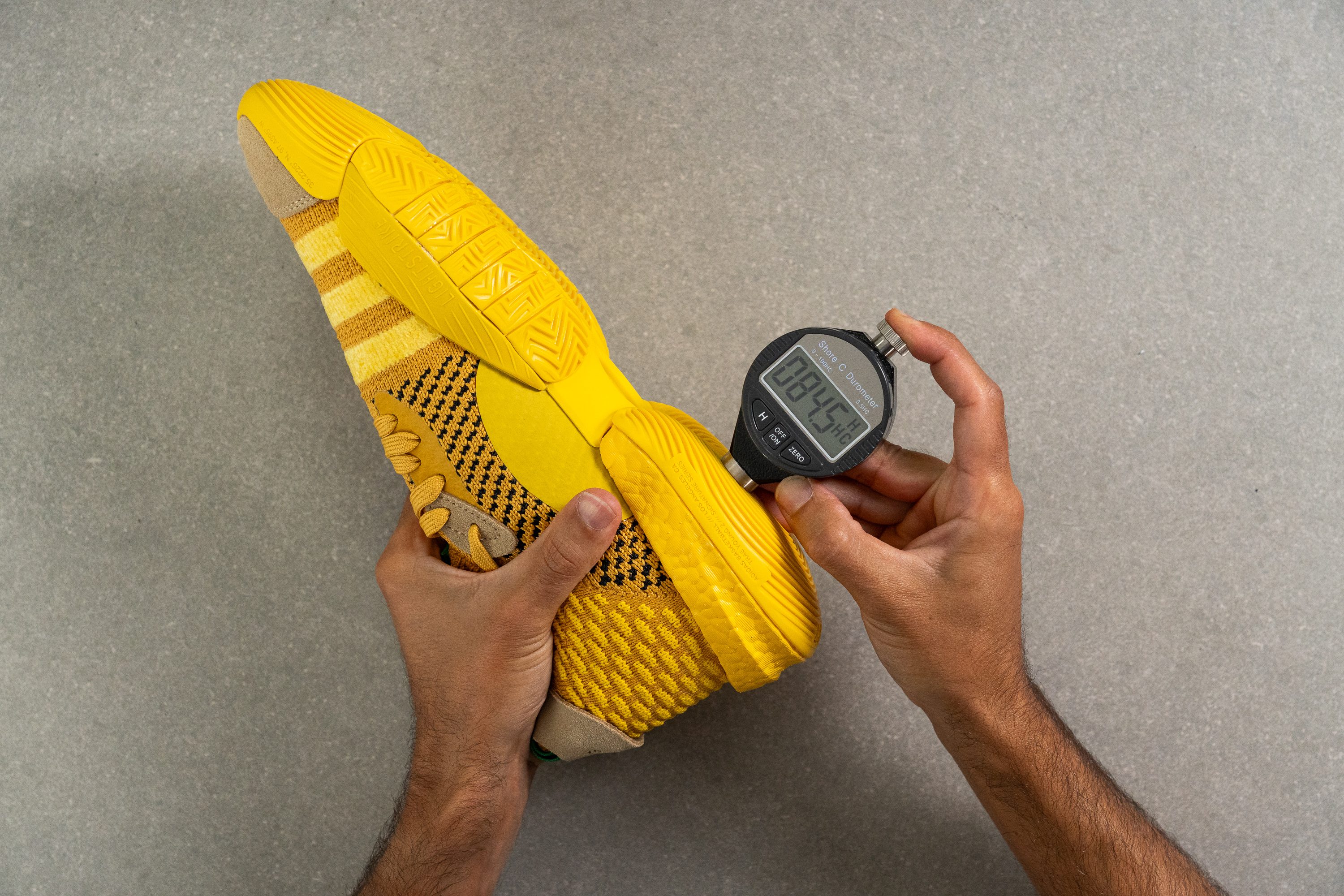
| Trae Young 2 | 84.8 HC |
| Average | 81.5 HC |
Outsole durability
When it was time to get real with this Adidas shoe, we turned to our Dremel and found that its outsole performed worse than average.
After 22 seconds of drilling at a high speed of 10K RPM, the outsole developed a 1.6 mm deep dent. That's more than what we normally get in hoop shoes that are meant for hardcore outdoor use. For example, the Harden Vol. 7 only got 0.5 mm.
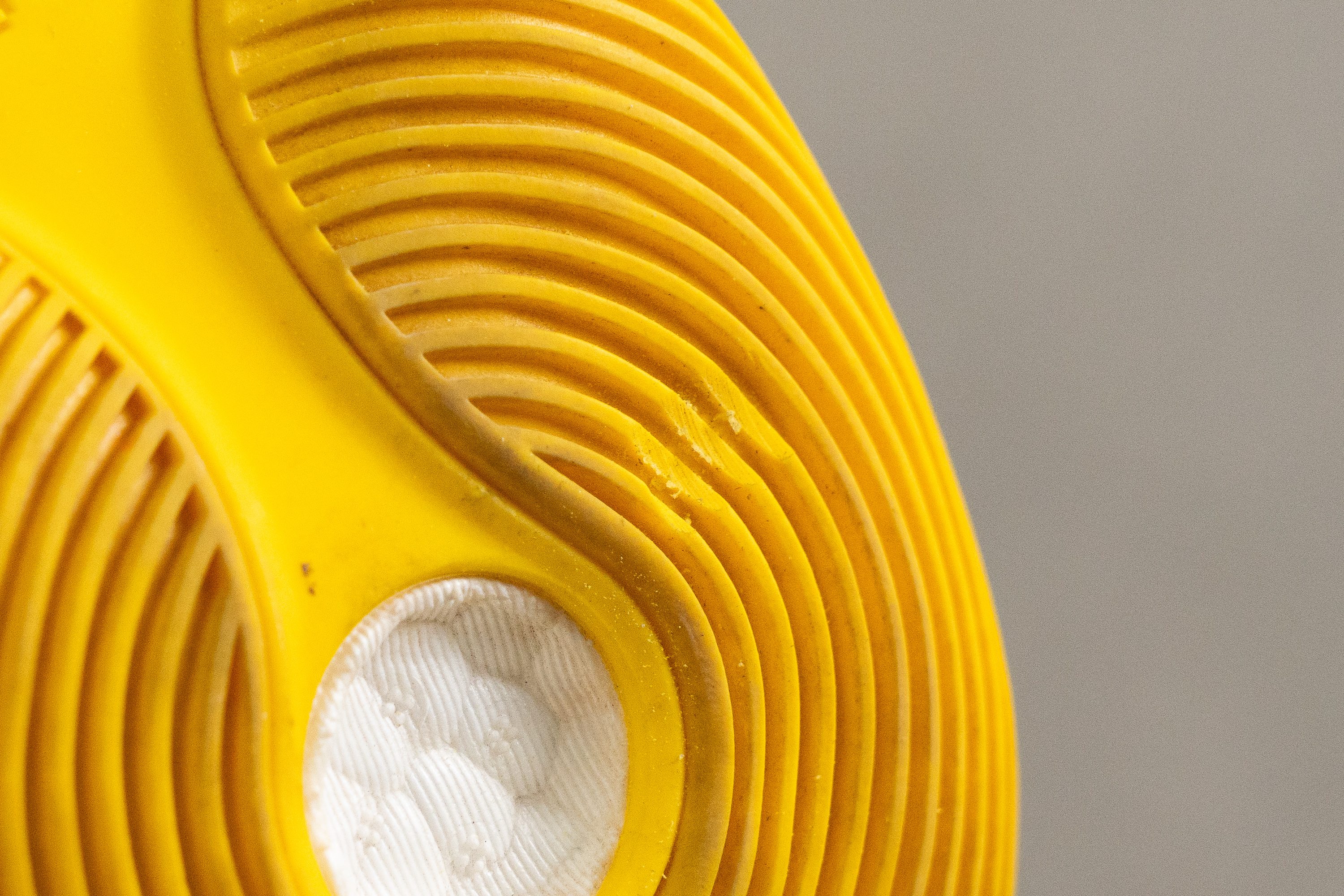
But the good news is that the Trae Youg 2 is not horrible for outdoor courts either! We think that you can absolutely enjoy an occasional game without worrying about destroying the shoe.
| Trae Young 2 | 1.6 mm |
| Average | 1.0 mm |
Outsole thickness
The amount of rubber protecting this Adidas shoe is also slightly thinner compared to other shoes. Our caliper shows 3.4 mm which is a little below the average.
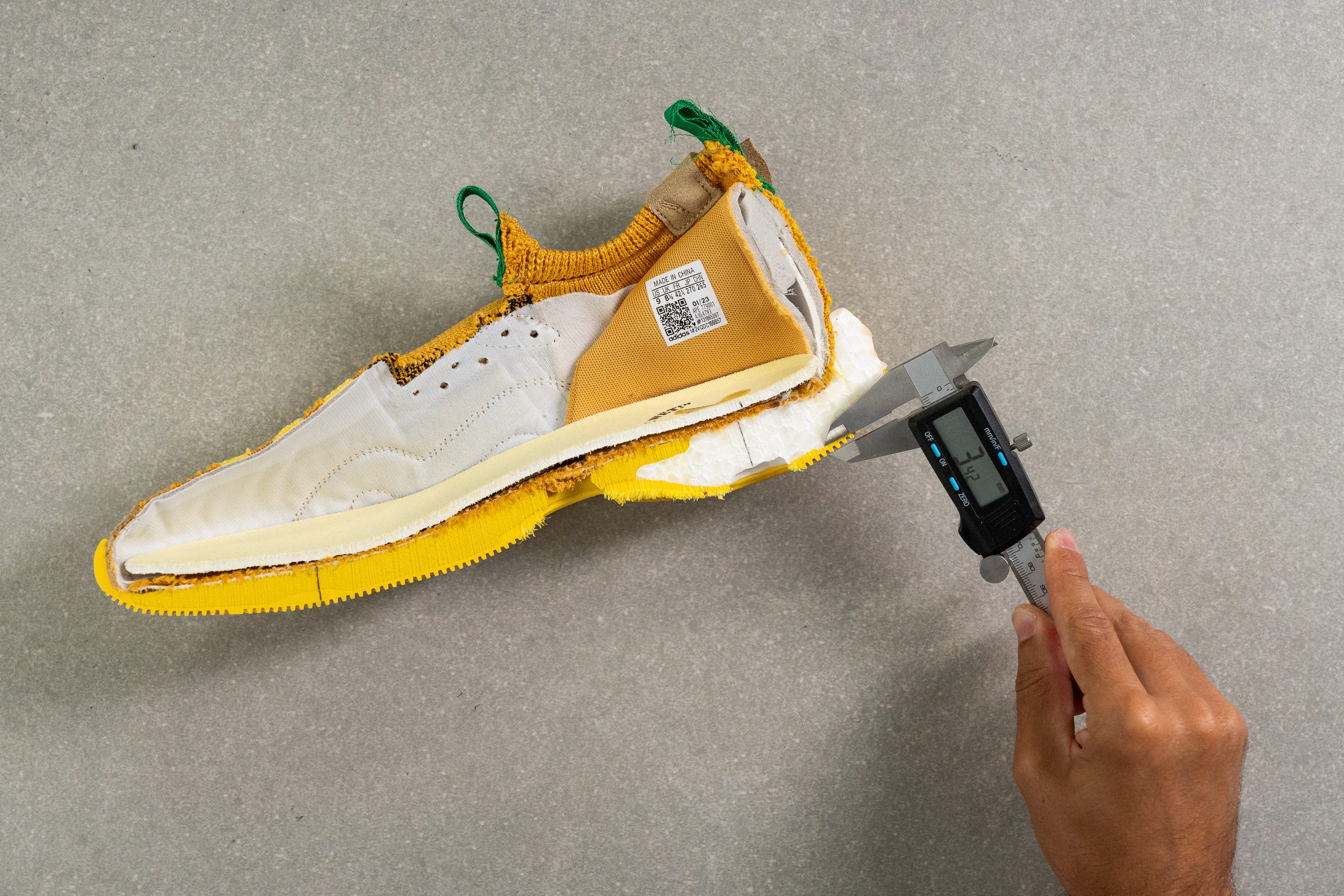
| Trae Young 2 | 3.4 mm |
| Average | 4.0 mm |
Misc
Insole thickness
We always include the insole when measuring stack heights. In the case of the Adidas Trae Young 2, it is 3.9 mm thick in the heel.
Slightly thinner than average, but still feels amazing underfoot combined with the Boost/Lightstrike setup.
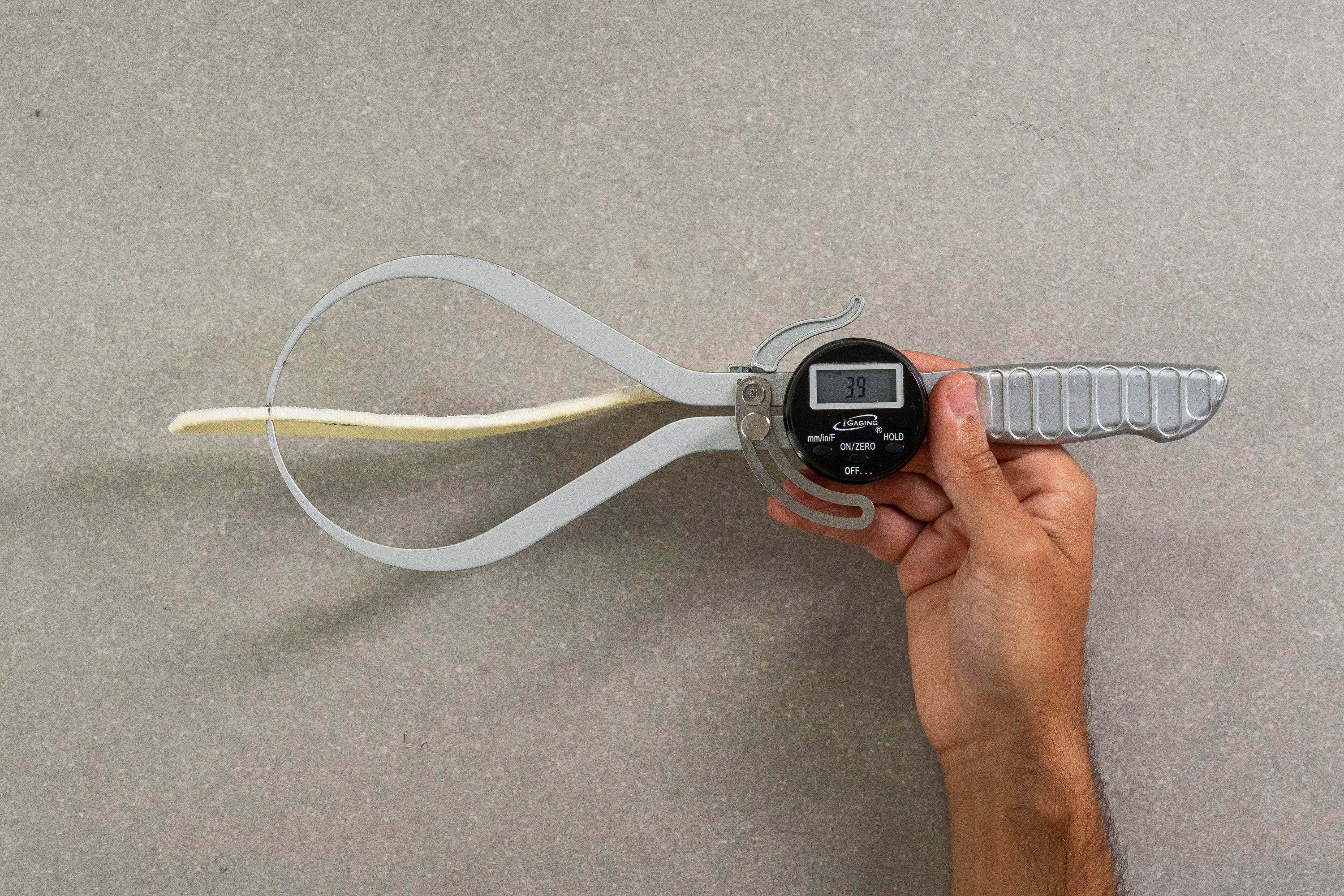
| Trae Young 2 | 3.9 mm |
| Average | 4.9 mm |
Removable insole
The shoe comes with a removable sole which can be swapped for any other insert or orthotics of your choice.
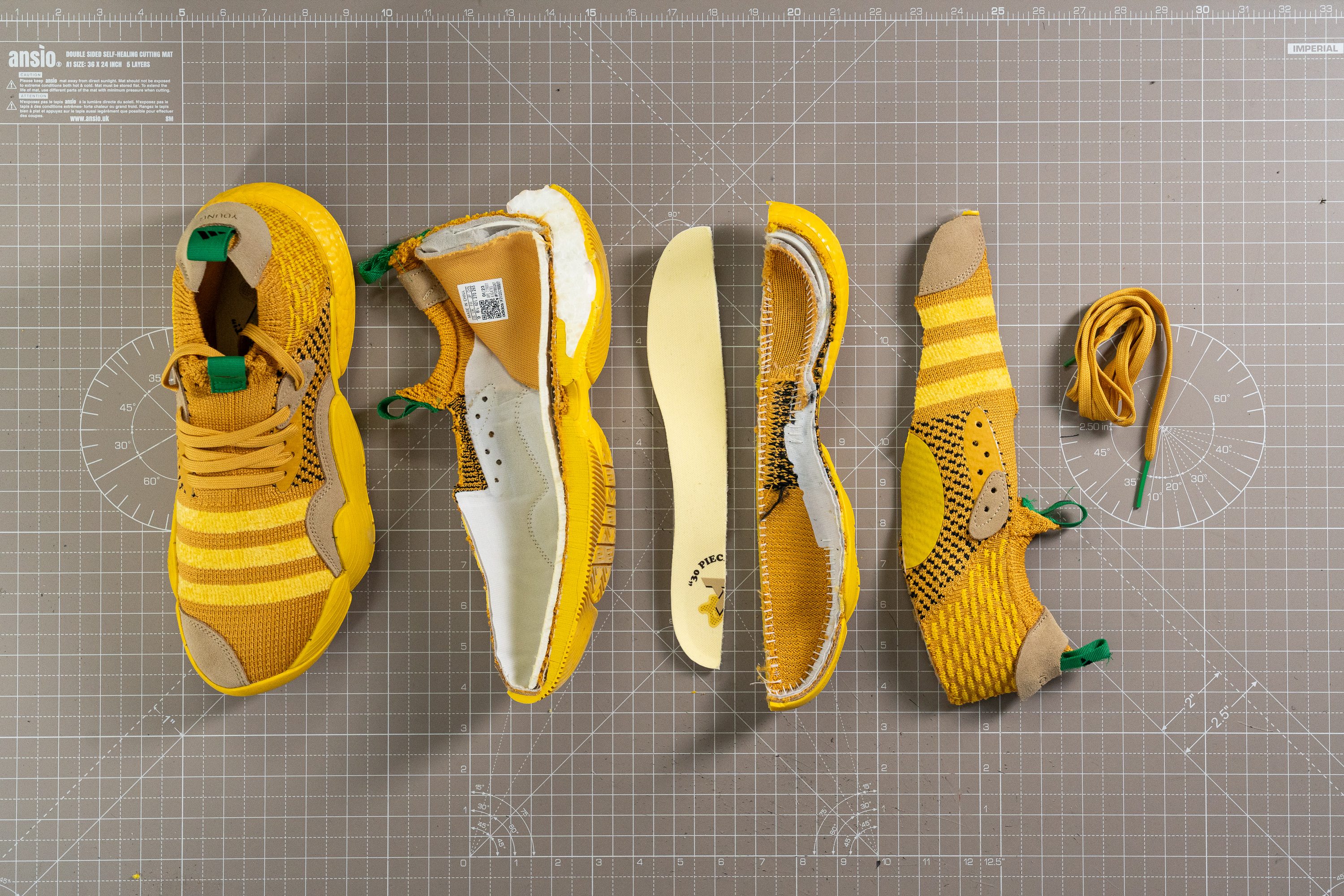
| Trae Young 2 | Yes |
Tongue padding
Lace bites could very likely be a problem for high-arched players as there is only 1.3 mm of material separating the skin from the laces.
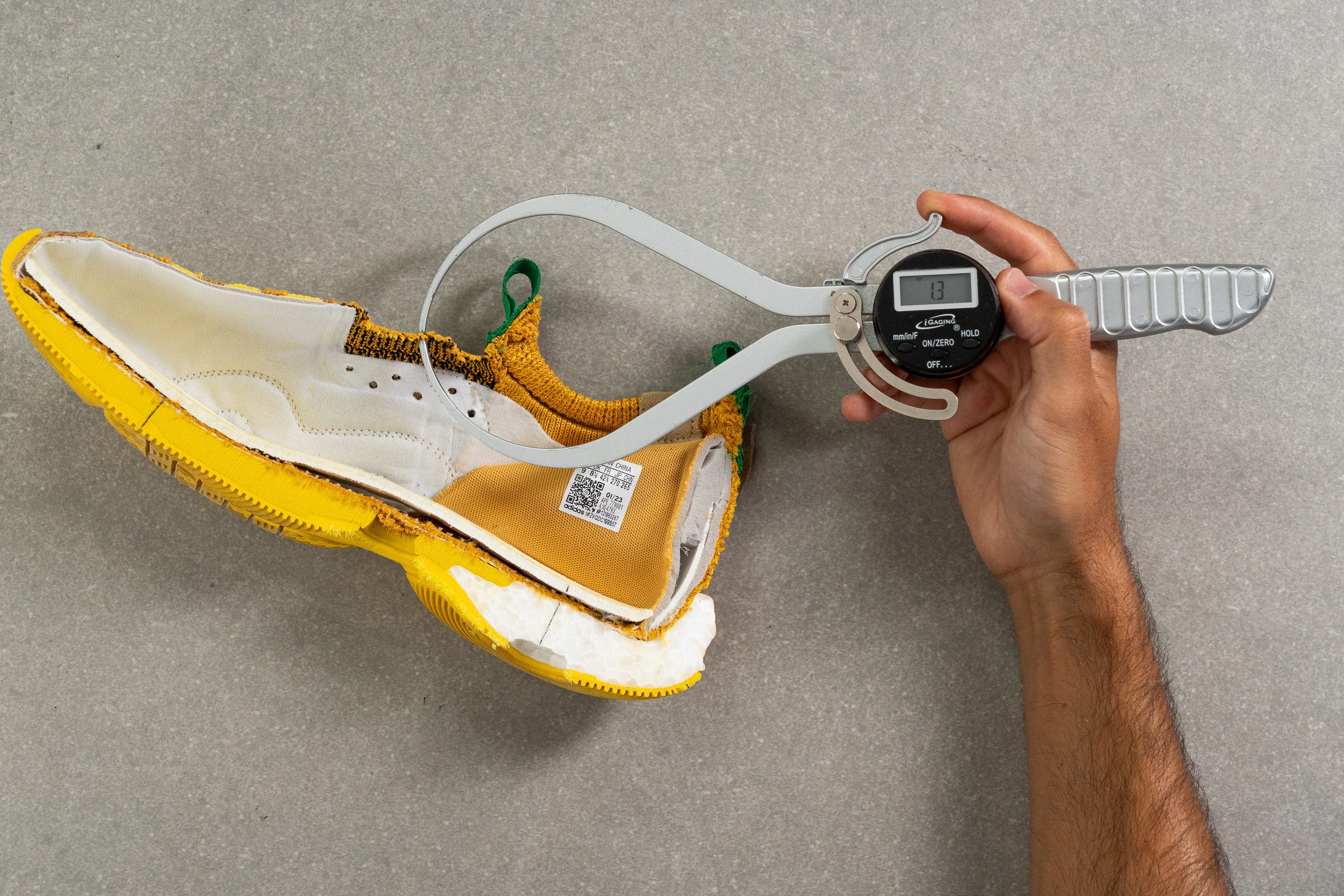
| Trae Young 2 | 1.3 mm |
| Average | 9.3 mm |
Tongue: gusset type
Given the shoe's sock-like collar, it doesn't have a tongue per se. The upper is made of this one-piece sockliner that is sewn together at the bottom of the shoe, underneath the insole. That way, it feels very much like a sock!
Once on, the shoe feels amazingly comfortable against the foot. And we could write a poem about its coziness if it wasn't for one "little" problem... It is a real pain in the neck to put on!
Because of its quite narrow and not-so-stretchy opening, we really struggled to get the Adidas Trae Young 2 on. Every. Single. Time! And it doesn't get better with time, unfortunately.
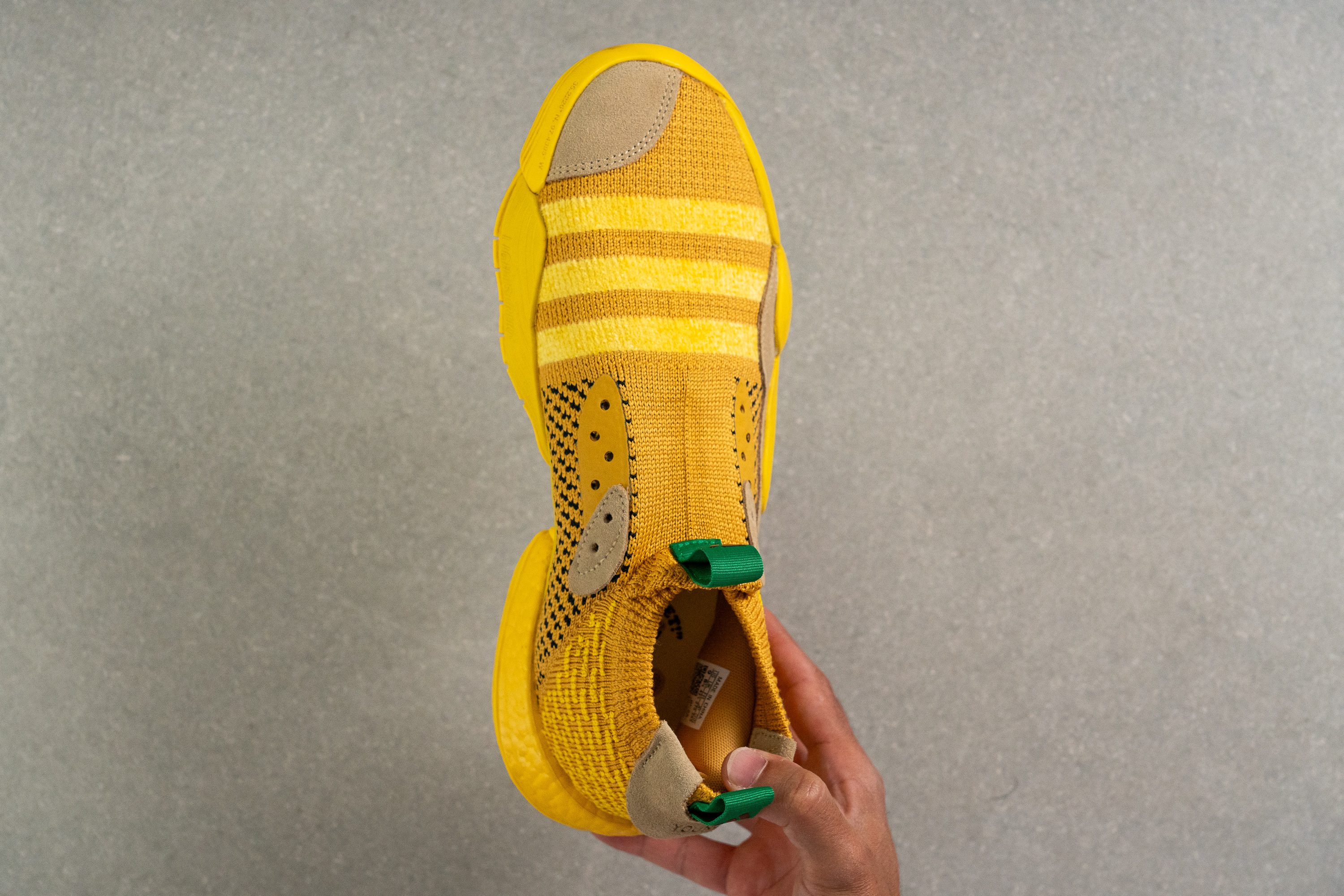
| Trae Young 2 | Sock like |
Heel tab
It was very kind of Adidas to add two pull tabs on both sides of the collar but... it would be nice if they actually helped to get the shoe on more easily.
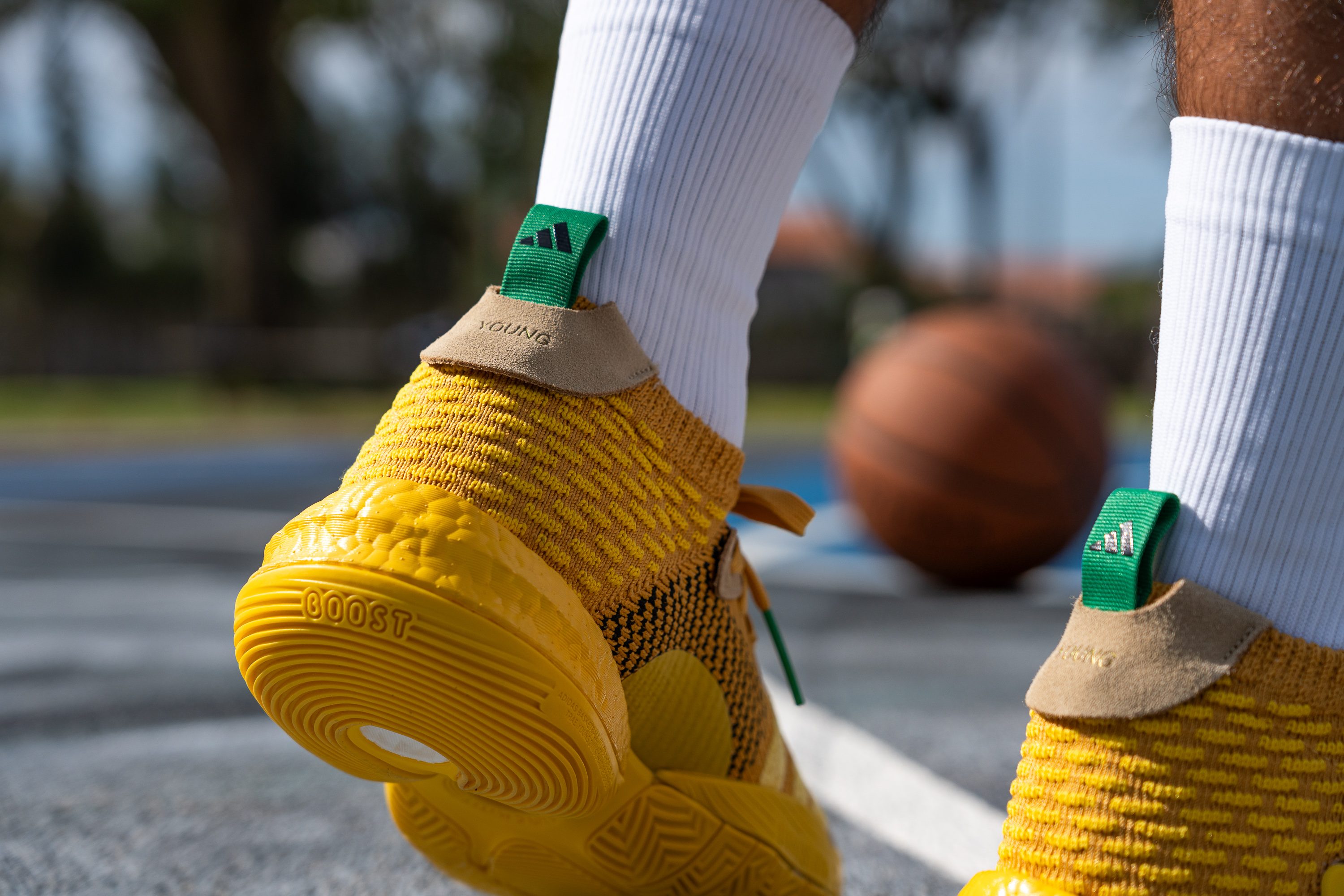
| Trae Young 2 | Finger loop |

